#but because those tools exist companies choose to profit off them
Explore tagged Tumblr posts
Text
The absolutely awful thing is - it's everywhere now and they won't take it back.
All the new laptops that are being brought into stores like my work are being advertised as being good because they have AI in them when really it's a.) unethical, b.) producing more emissions, and c.) ruining industries and livelihoods while they're at it
We're supposed to be repping this stuff. These are supposed to be 'features' and 'benefits' but all I can think of are the implications of ai and capitalism
They are profiting off suffering and waste - and truthfully the only way to fix it is to stop and roll back technology, not using as much electricity or energy or stolen material for ai.
Even if it means i'm out of a job.

I don't know, how about switching it off?
#I can think of one singular valid use of ai#and that is to help people with disabilities#but because those tools exist companies choose to profit off them#and the world and the way it works isn't changing fast enough to adapt#ai is horrible#washington post#journalism#technology#work stories
63K notes
·
View notes
Text
Long-ass rant about artificial "intelligence"
"Capital A.I. is dead labour art, that, vampire-like, only lives by sucking living labour humans art, and lives the more, the more labour humans art it sucks." - Karl Marx, probably
I'm not afraid of A.I. stealing my job, I'm afraid of corporations and capitalism having another tool to exploit workers. I post my art and work on the internet for everyone to enjoy, NOT for tech companies to steal scrape them off for free then sell back to me for profit. Ofcourse businesses will choose A.I. over human to rip off workers and avoid responsibility. A.I. also doesn't go on strike or operate guillotines. Without the labour of real humans, those machine learning would not exist.
Even "A.I" is a misleading term, those machines are not intelligent. It is just a parrot repeating data fed to them without any understanding. But quality is not the priority of capitalism.
Like, everyone knows this right? Right??? Then why the fuck is my college teaching students to use A.I. image generator for their design course?
"But the A.I. generated-images look good and realistic." Those images remind me of how cyberpunk is used in mainstream media: just surface-level aesthetic without the original philosophy and politics (also incredibly white-washed). Just look at them. On the surface, those images appear "real", but the more you look at it, there's no detail, no intention, no meaning, nothing interesting to talk about. Human art (especially abstract art) is the opposite. Those images only look realistic to us, because our human brain is very good at finding patterns out of meaningless shapes, the A.I. doesn't understand or even know those patterns exist.
I bet A.I. can't create anything remotely resemble my Viet Futurism project.
Remember other fictitious capitals like crypto and NFTs? Yeah, me neither, because they crashed and are now worthless. Money doesn't have value, labour does.
#I choose graphic design over fine arts because I love design research and want to make things better#But it's still business at the end of the day isn't it#“A.I. is gonna destroy the world!” Nah capitalism climate change and rising fascism globally will run us into the ground in 20 years#talks#ai#artificial intelligence#image generator#ai art generator
2 notes
·
View notes
Text
Understanding the aftermath of r/wallstreetbets

A couple days back, I wrote up my best understanding of what happened with /r/wallstreetbets and meme stocks like Gamestop, trying to show how all the different, seemingly contradictory takes on the underlying financial stuff could all be true.
https://pluralistic.net/2021/01/28/payment-for-order-flow/#wallstreetbets
In the days since, a new series of contradictory takes has emerged, these ones disputing the meaning of this bizarre financial spectacle, and likewise what response, if any is warranted as it unfurls.
I think that all of these takes can also be true, and as with the trading itself, reconciling them requires that we widen the frame.
Let's start with Jimmy Carter.
In 1978, Carter's IRS created the 401(k), a tax-sheltered account for people who wanted to gamble on stocks to fund their retirement.
That was a fringe proposition at best.
The normal retirement system was a "defined benefits" pension where your employer guaranteed you a certain monthly percentage of your salary from retirement to death.
The vast majority of Americans wisely prefered a guaranteed payout to a tax-advantaged gambling account.
Obviously, right? On the one hand, you have the guarantee of a pension (maybe even inflation-indexed); on the other, you have a bunch of bets, that, if they go wrong, leave you literally homeless and starving.
When gamblers remortgage the family home and cash in the kids' college funds to play the tables, we consider them to have a mental illness, a pathological condition that harms them and the people around them.
Giving up a defined benefits pension in favor of a 401k is just the same kind of bet - staking all the money that will support you when you exit the workforce on the movement of stocks and bonds.
Who would do that voluntarily?
Pretty much no one. But the transition from defined benefits to 401k was not voluntary. Finance ghouls like Ethan Lipsig wrote memos to major employers like Hughes Aircraft showing them how they could ditch their pension obligations by moving workers to 401ks.
In the 80s, Reagan created a bunch of legal tools that allowed employers to coerce their workforces into giving up the security of a pension and force them into gambling their salaries on the prayer of a win in the markets.
This was insanely, amazingly great for the finance sector, in three ways:
1. It made companies more profitable. Guaranteeing that the workers whose labor made your company viable wouldn't spend their dotage starving and homeless is expensive.
Helping fund wagers on shares is much cheaper. The finance sector represented the major shareholders of the companies that transitioned to 401ks. The savings were transferred to these shareholders and the finance sector got commissions.
What's more, this temporary inflation of share prices disguised what was going on with the pension switcheroo: workers' defined benefits pensions were liquidated and turned into stocks, just as stocks were going up because their pensions had been liquidated!
Their legs had been amputated out from under them, but so subtly that they didn't yet feel the pain - and now their bosses cooked their legs and snuck them into their dinner, and everyone marveled at how full they felt after that hearty, meaty meal.
2. 401ks brought a lot of suckers to the table. The market was - and is - dominated by "sophisticated investors," AKA predators, who knew all the ways to fleece the rubes who had no idea how any of this worked.
The predatory nature of finance only increased over time. Hedge funds, for example, exist to find unethical practices that are legal (thanks to loopholes in the rules) and exploit them until they are illegal.
3. 401ks created a political force outside the finance sector that would lobby on its behalf. Transforming America into a nation of stockholders meant that workers had to choose between supporting rules that protected their jobs and rules that protected their retirement.
For your pension account to grow, you had to support policies that permitted finance ghouls to offshore your job, or misclassify you as a contractor, or eliminate the safety rules that prevented you from being maimed, or take away your right to sue for compensation.
Every time there's a particularly ghastly bankruptcy driven by PE or hedge funds - Toys R Us, Sears, etc - it emerges that at least some of that money is coming out of a union pension fund.
That's marketization - turning the once obscure, boring business of market-based capital allocation into a matter of import to everyday people.
Marketization begat financialization.
While marketization is primarily about capital allocation (who gets what money), financialization is about bets. Sometimes those bets are about things - businesses, houses, coal and timber - but things are limited. Mostly the financial market consists of bets on other bets.
Bets are infinite. Every time you make a bet, you create inventory for a market in a bet on the outcome of your bet. And that's inventory for a new market: bets on the outcomes of bets on the outcomes of bets.
It's called Wall Street Bets for a reason.
Bets need referees, someone who decides who the winner is. In sports, it's a major scandal if a referee is caught wagering on one of the teams in a match. In the financial markets, it's the norm - referees that lay wagers on the outcome of the contest they're overseeing.
Let's take stock:
Workers are forced to play the casino, and if their bets fail, they spend their old ages homeless and starving;
The vast majority of casino games are wholly abstract - bets on bets on bets - and require layers of refs;
the refs are all crooked.
Every couple of years, we have a massive, systemic financial crisis, and every time that happens, the finance sector lobbies for a no-strings-attached bailout, abetted by suckers who hate the finance sector but fear starving in their old age.
We're about to be engulfed in the second-largest crisis of our lifetime - the reckoning from trillions in capital market gains propped up by the Trump administration's policy of buying all corporate debt as a covid stimulus.
https://pluralistic.net/2020/09/28/cyberwar-tactics/#aligned-incentives
(the largest crisis of our lifetimes is a few years off, as the climate emergency piles losses on losses, stranding tens of trillions in assets, from fossil fuels to obsolete gas-stations to literally underwater coastal real-estate to whole towns incinerated by wildfires)
That's where we're at: a crooked casino that we've trusted our futures too, a crisis on the horizon, and a bunch meme-stock "players" who have thrown the normal weirdness of the market into stark relief through a spectacular stunt.
A lot of people are angry at Robinhood, the stock-trading platform at the center of all this. Robinhood froze trading on meme stocks, and has only allowed it to come back in a useless, performative trickle that is seemingly calculated to prevent more meme-stock gamesmanship.
Is Robinhood just another crooked ref? Yes…and no. The meme stock run upset the stable cheaters' equilibrium whereby cheating never escalated to the point where the game just collapsed.
For example, the total short position on Gamestop exceeds its total stock issuance.
Translation: there were more Gamestop shares promised between bettors than exist. When the game stops, all those promises come due, and they literally can't be paid off because there aren't enough tokens in circulation to settle all the debts.
Robinhood halted trading in part because the big fish upstream of Robinhood also halted trading, because they have even more at risk than Robinhood does if the game collapses - they the refs for MANY players, all the same size as Robinhood or larger.
https://www.bloomberg.com/opinion/articles/2021-01-29/reddit-traders-on-robinhood-are-on-both-sides-of-gamestop
But remember, the refs are cheating. And they are both downstream and upstream from other games in which the refs are also cheating.
And the games, as a whole, encompass our economy, including the solvency of the "real economy" (the people who make masks, deliver groceries and drive ambulances), and whether you spend your old age homeless and starving.
So the people who say, "Don't blame Robinhood, they didn't halt trading to help billionaires, they halted trading to prevent the game from collapsing are right."
But they're not the only ones who are right.
Also, there's the people who say that meme stocks aren't making money for little guys at the expense of the big guys. They're right too.
First, because these stocks will all need to be converted to cash, and that means selling them.
https://arstechnica.com/tech-policy/2021/01/the-gamestop-bubble-is-going-to-hurt-a-lot-of-ordinary-investors/
When the selloff starts, the price will plunge, because even if the stock was undervalued before, it's certainly overvalued now. Every bubble produces wealth for its early bettors who sell out to later players who lose everything when they can't find a sucker later on.
From Beanie Babies to subprime, bubbles burst and leave suckers holding the bag. If you just heard about meme stocks last week, you're too late to make money off of them.
There's another version of the "this isn't little guys, it's big whales" that's *also* true: the main beneficiary of the meme stock runs is giant funds who magnified and the bets from r/wallstreetbets and got out smart and fast.
https://twitter.com/zatapatique/status/1354904995901136896
So given all this, what can we make of calls (from parties as varied as AOC and Ted Cruz) to investigate Robinhood and other retail brokerages to see whether they're honest refs, or in the tank for billionaires?
At Naked Capitalism, Yves Smith calls this a "fatuous uproar," saying that the Senate has more important things to do during the racing-out-of-control pandemic than to investigate a literal penny-ante grift.
https://www.nakedcapitalism.com/2021/01/the-fatuous-uproar-about-robinhood-and-gamestop.html
Do we really care who the winner is in "a beauty contest between Cinderella’s ugly sisters" ("clueless new gen day traders versus clumsy shorts")?
Smith is right too.
A speculator-v-speculator contest that falls apart when the crooked ref halts play to prevent collapse - who cares who "wins?"
But here's how they can all be right - the "who cares" and the "goliath v goliath" and the "bubble" and the "Robinhood is a plutes' honeypot."
*If* there's hearings, and *if* those hearings expose the absurdity and corruption of the system, *then* there is a chance to build the political will to make real, systemic changes when the crisis comes.
And there's a real crisis coming: two, in fact. The covid junk bond financial crisis, which is due very soon, and the climate crisis stranded asset emergencies, which will unroll with increased tempo and intensity for decades to come.
The half-century cycle of "addressing" finance crises by increasing financialization MUST stop.
If the meme stock spectacle gets us to pay attention to hearings that reveal the irredeemable rot of the system, then it's a unique chance to spread *real* "financial literacy."
And that literacy is the necessary (but insufficient) precursor to taking action when the time comes - and the time is certainly coming soon.
134 notes
·
View notes
Link
LETTERS FROM AN AMERICAN
July 23, 2021
Heather Cox Richardson
On July 20, 1969, American astronauts Neil Armstrong and Edwin “Buzz” Aldrin became the first humans ever to land, and then to walk, on the moon.
They were part of the Apollo program, designed to put an American man on the moon. Their spacecraft launched on July 16 and landed back on Earth in the Pacific Ocean July 24, giving them eight days in space, three of them orbiting the moon 30 times. Armstrong and Aldrin spent almost 22 hours on the moon’s surface, where they collected soil and rock samples and set up scientific equipment, while the pilot of the command module, Michael Collins, kept the module on course above them.
The American space program that created the Apollo 11 spaceflight grew out of the Cold War. The year after the Soviet Union launched an artificial satellite in 1957, Congress created the National Aeronautics and Space Administration (NASA) to demonstrate American superiority by sending a man into space. In 1961, President John F. Kennedy moved the goalposts, challenging the country to put a man on the moon and bring him safely back to earth again. He told Congress: “No single space project in this period will be more impressive to mankind, or more important for the long-range exploration of space; and none will be so difficult or expensive to accomplish.”
A year later, in a famous speech at Rice University in Texas, Kennedy tied space exploration to America’s traditional willingness to attempt great things. “Those who came before us made certain that this country rode the first waves of the industrial revolutions, the first waves of modern invention, and the first wave of nuclear power, and this generation does not intend to founder in the backwash of the coming age of space. We mean to be a part of it—we mean to lead it,” he said.
[T]here is new knowledge to be gained, and new rights to be won, and they must be won and used for the progress of all people…. We choose to go to the moon in this decade and do the other things, not because they are easy, but because they are hard, because that goal will serve to organize and measure the best of our energies and skills….”
But the benefits to the country would not only be psychological, he said. “The growth of our science and education will be enriched by new knowledge of our universe and environment, by new techniques of learning and mapping and observation, by new tools and computers for industry, medicine, the home as well as the school.” The effort would create “a great number of new companies, and tens of thousands of new jobs…new demands in investment and skilled personnel,” as the government invested billions in it.
“To be sure, all this costs us all a good deal of money…. I realize that this is in some measure an act of faith and vision, for we do not now know what benefits await us.”
Seven years later, people across the country gathered around television sets to watch Armstrong step onto the moon and to hear his famous words: “That's one small step for [a] man, one giant leap for mankind.”
President Richard Nixon called the astronauts from the White House: “I just can't tell you how proud we all are of what you have done,” he said. “For every American, this has to be the proudest day of our lives…. Because of what you have done, the heavens have become a part of man's world…. For one priceless moment in the whole history of man, all the people on this Earth are truly one…in their pride in what you have done, and…in our prayers that you will return safely to Earth.”
And yet, by the time Armstrong and Aldrin were stepping onto the moon in a grand symbol of the success of the nation’s moon shot, Americans back on earth were turning against each other. Movement conservatives who hated post–World War II business regulation, taxation, and civil rights demanded smaller government and championed the idea of individualism, while those opposed to the war in Vietnam increasingly distrusted the government.
After May 4, 1970, when the shooting of college students at Kent State University in Ohio badly weakened Nixon’s support, he began to rally supporters to his side with what his vice president, Spiro Agnew, called “positive polarization.” They characterized those who opposed the administration as anti-American layabouts who simply wanted a handout from the government. The idea that Americans could come together to construct a daring new future ran aground on the idea that anti-war protesters, people of color, and women were draining hardworking taxpayers of their hard-earned money.
Ten years later, former actor and governor of California Ronald Reagan won the White House by promising to defend white taxpayers from people like the “welfare queen,” who, he said, “has 80 names, 30 addresses, 12 Social Security cards and is collecting veteran’s benefits on four non-existing deceased husbands.” Reagan promised to champion individual Americans, getting government, and the taxes it swallowed, off people’s backs.
“In this present crisis, government is not the solution to our problem; government is the problem,” Reagan said in his Inaugural Address. Americans increasingly turned away from the post–World War II teamwork and solidarity that had made the Apollo program a success, and instead focused on liberating individual men to climb upward on their own terms, unhampered by regulation or taxes.
This week, on July 20, 2021, 52 years to the day after Armstrong and Aldrin stepped onto the moon, former Amazon CEO Jeff Bezos and four passengers spent 11 minutes in the air, three of them more than 62 miles above the earth, where many scientists say space starts. For those three minutes, they were weightless. And then the pilotless spaceship returned to Earth.
Traveling with Bezos were his brother, Mark; 82-year-old Wally Funk, a woman who trained to be an astronaut in the 1960s but was never permitted to go to space; and 18-year-old Oliver Daemen from the Netherlands, whose father paid something under $28 million for the seat.
Bezos’s goal, he says, is not simply to launch space tourism, but also to spread humans to other planets in order to grow beyond the resource limits on earth. The solar system can easily support a trillion humans,” Bezos has said. “We would have a thousand Einsteins and a thousand Mozarts and unlimited—for all practical purposes—resources and solar power and so on. That's the world that I want my great-grandchildren's great-grandchildren to live in.”
Ariane Cornell, astronaut-sales director of Bezos’s space company Blue Origin, live-streamed the event, telling the audience that the launch “represents a number of firsts.” It was “[t]he first time a privately funded spaceflight vehicle has launched private citizens to space from a private launch site and private range down here in Texas. It’s also a giant first step towards our vision to have millions of people living and working in space.”
In 2021, Bezos paid $973 million in taxes on $4.22 billion in income while his wealth increased by $99 billion, making his true tax rate 0.98%. After his trip into the sky, he told reporters: “I want to thank every Amazon employee and every Amazon customer because you guys paid for all of this…. Seriously, for every Amazon customer out there and every Amazon employee, thank you from the bottom of my heart very much. It’s very appreciated.”
—-
Notes:
https://www.businessinsider.com/jeff-bezos-space-flight-passenger-revealed-wally-funk-2021-7
https://www.businessinsider.com/blue-origin-auction-spacecraft-jeff-bezos-winner-seat-astronaut-2021-6
https://www.businessinsider.com/jeff-bezos-launches-to-space-blue-origin-first-human-spaceflight-2021-7
https://www.washingtonpost.com/business/2021/06/08/wealthy-irs-taxes/
https://www.businessinsider.com/jeff-bezos-thanks-amazon-customers-for-paying-trip-to-space-2021-7
Share
LETTERS FROM AN AMERICAN
HEATHER COX RICHARDSON
[From comments: “When you’ve been able to amass your money by not paying your fair share of taxes, your “privately funded” venture is a diversion of rightfully public funds. This new space race is publicly funded, but absent public controls and alignment. Socialize the expenses, privatize the profits.”
“After May 4, 1970, when the shooting of college students at Kent State University in Ohio badly weakened Nixon’s support, he began to rally supporters to his side with what his vice president, Spiro Agnew, called “positive polarization."Combined with the unsubtle racism of Nixon's Southern Strategy, thus began the decades long Republican policy of dividing Americans against each other that has led us to what we have today; two Americas that reside in different universes, and our national wealth controlled by a handful of unelected, supremely, in some cases psychotically, self-centered white men.Jeff Bezos could not have existed in Kennedy's America. We must make that so again.”
#political#polarity#division#greed#Heather Cox Richardson#history#space race#common good#Letters From An American#wealth inequality#fair share
7 notes
·
View notes
Text
Okay, let me tell you something.
I have seen so many people shitting on die ärzte and this video on many social media platforms just because it uses AI, and it's really starting to grind my gears, and I cannot keep my mouth shut anymore.
Disclaimer: Know that I AM against so-called AI art and AI generated texts and whatnot, because a computer cannot create new things from scratch and everything it creates is based on data it has collected, and all that data is created by humans, because also the computers and AI was built by humans. I'm also terrified of the amount of AI "photos", because I personally find it difficult or even impossible to tell them apart from real ones, and I wish I could, but I just can't. There was an article on AI generated images, texts and audios on my country's news broadcast website, and it had a test where you had to choose whether a "photo" was real or made with AI, or to choose the AI one from several. I failed miserably. So it is dangerous what comes to misinformation and all that jazz.
Talking of misinformation, I feel that also the anti-AI posts on Tumblr are spreading a shitload of misinformation, and people just see the word AI and jump on the "we hate AI here bandwagon" without really understanding what AI is.
I'm no expert on this either, but let's just say I'm an older millenial, grew up in the time when internet was reaching the regular person's home (in Europe), and currently I am a media student so I have some knowledge over the tools and methods used in the media field, where AI generators and AI tools are getting more and more popular, unfortunately.
You know that all computers are AI, right? People have worked on AI as a concept since the 1940s. Scifi books and movies and other medias have bee playing with the idea of an artificial inteligence for ages, most stories ending up with machines taking over humans. (You know, in the music video description, HAL 9000 is the evil AI/computer antagonist of the 60s film 2001: Space Odyssey; and Skynet is the somewhat evil network in Terminator franchise that was going to destroy the world. In the mv, both films were referenced, and so was Matrix, and maybe some others.)






All these random-ass tools and apps we call as AI today have gotten so huge over the past few years, and the word AI alone has become a trend word and a marketing hack. All these companies working on software programs have noticed this, and realized they can profit off of the word. A company such as Adobe realized "hey, what if we call this old af tool 'uses AI to select objects!' in this new update, people will buy our product more for sure!". Their competitors noticed it, and went "shit, Adobe* is using AI, we better do that too". Becaue AI = profit. But is that really AI? Well, technically yes, but it doesn't mean "this computer generates stolen art". It means "this tool has always existed in this software but the code is made better as technology gets better" and guess what: it has always been AI, sorta. It has always been that computer doing the task, but now we just call it AI instead because it's Trendy™️. And more profit for companies selling these products yadayada. It's still a different thing from an AI GENERATOR. That fetches the data collected and created by humans.
At school we use Adobe products, and I hate the fact it's promoting AI in everything. It's literally calling features that have existed for a long time, as AI. But it also keeps introducing more and more AI generator type features to their softwares. At school we're taught about AI, we are taught how to use Midjourney among others, we're literally having media professionals promoting AI generator tools. Media companies use AI generator tools even! And it sucks, and I personally have chosen to not touch those even with a long stick after I found out they just use existing data and art humans created.
Now, to the music video. What exactly is AI in this video? To that I don't have proper answers, only guesses, but I wish I knew more. I tried looking into this, but I wasn't able to find much anything. I'm still going to do my best and analyze the video, and break it down to what I could find.
I found the director's Instagram and his posts always mention the people who have worked on the videos with him. This is what is written to the descs of DEMOKRATIE clips:

You see it already? "Created and directed by" and just his name. Meaning, there was no crew. "Why not hire an artist, then?!" you may ask. Well, as a media student and a hobbyist, let me explain some things:
Hiring people costs money, depending on the person, they might be in a financial situation where hiring is not an option. Especially if you're a freelancer of any sort. (Now, I know this director has made massive videos for ages, but you never know what kind of situation someone might be in as in media and art business nothing is ever certain.) [However, companies that already sit on a mountain of money should be forbidden from using AI etc. and forced to hire real people instead.]
The deadlines, which I assume were very strict and quick. You know how much times goes into creating an animation? Depending on the method, you can spend hours on drawing frames that become a video that lasts 10 seconds. Let alone a video that consist of tons of scenes and lasts over 4 minutes.
This used existing music videos and sure, you could trace those down, but it would still take time because you would have to go through the clips frame by frame, and the framerate of music videos in Europe is usually 25 FPS (frames by second), so 10 seconds of video is already 250 frames, as in images, to trace down. For this we've got tools that now people love to call as AI and think it's the same as an AI generator.
I really wish I knew more of the process of making the video, but I feel that so many people think this video was completely written, "drawn" and edited by an AI. That's... just not possible. The AI as we know it, is not that advanced yet really. I'm not so experienced with AI generators and other tools, but this video was way too structured and made too much sense to be by AI alone. It matches with the lyrics too well, so it was definitely cut and edited by a human being. It uses German and English sometimes, as in real alphabets, which AI can't do -> edited by a human being.

There are some scenes with AI generator type of scribbling, such as this:

And with this next one I'm not sure if it's supposed to resemble Greek alphabets, or if it's just AI not understing any kind of alphabets. But we can still read it, right?

And it's got the Gwendoline logo right, too.
I really wish there was some sort of a behind-the-scenes thingy for this video as I'd be so curious to know how this was done. If we look at how the video is promoted on the website and Youtube desc, it says this:

It says "AI has recalculated die ärzte", which is why I assume they used some sort of AI to create the new fake dä. As I said, I haven't used the AI tools much because I don't like them and prefer doing everything myself, so I'm not sure what they're capable of today. My first thought was that he just fed the videos to AI to get them out with a cartoon filter on them. I'm not sure if you can do that in these softwares already. I would not be surprised if, say Adobe After Effects, had some sort of "turn your videos into paintings!" AI feature in it. They already advertise rotoscoping and tracking as AI, which it technically is because it's the computer doing the motion tracking but as I said, AI is the trend word so it sounds "cooler" and more profitable if they mention AI at the side too.
What comes to the rest of it, it's edited by a human being FOR SURE. I know that today AI can do some cutting for a video, but it can mostly just do stuff like cut out silent parts of a video if it's e.g. a podcast, but it still has to be reviewed by a human being because it might also miscalculate and cut out bits a human being would keep in the video. But it cannot take clips and edit them into together. It can create a video from a prompt, but it cannot build a video from other videos, and that is EXACTLY what this video is: it's built from pieces that are different video clips. So so so many different video clips.

My last point with this video is that, as the description says too, it is really fitting. Does Die Ärzte using AI generated video mean they support AI generators? No. Is it a statement? Could be! There are constantly news about governments using AI to monitor and track and literally spy on their people. Something that is forbidden in EU due to privacy, but it does happen in the US (not sure about Canada), Russia, China... you name it. And then the fake news, you literally cannot trust anything on the internet anymore because a news article could have been written by an AI. Or someone creates a photo or article with an AI and spreads it as a fact. Or they post it as fake, but it's not clear enough so someone else takes it as real. GOOGLE does this nowadays, it just references articles and uses photos without fact-checking and you literally cannot trust any first results anymore, because the chances are that it is not real.
I feel that this was another point the band wanted to make with this video. AI is everywhere, and it's not necessarily a good thing. It says Fake-DÄ fighting against fake-news. It's the same case as just because someone writes a book about a murdered, does not mean the author is a murderer. A band can make a music video with AI to have a statement, and not support AI generated art.
Things are not so black&white.
DEMOKRATIE music video
youtube
#die ärzte#as a sidenote I also really really like the song and also its message#maybe I just come from a different position since I'm from and live in Finland and am well aware what's going on behind the east border...
38 notes
·
View notes
Text
10 Best Free Investing Apps in 2021
10 Best Free Investing Apps in 2021

Do you presently pay exorbitant investment fees? Do you only invest a little amount of money and can't afford the fees charged by the majority of internet brokers?
Instead, have a look at these investment applications. There are no yearly account fees that detract from your investment results. Some of these applications can manage your whole account for “hands-off” investors who don't want to deal with daily investment choices and portfolio rebalancing.
These applications can help you optimize your profits at the lowest possible cost, regardless of your financial history or approach.
Apps for Investing for Free
1. Vanguard 2. Webull 3. M1 Finance 4. Robinhood 5. Ally Invest 6. Betterment 7. Personal Capital 8. Fidelity 9. TD Ameritrade 10. Public
Because you invest to increase your income, free investing apps equate to more money in your wallet each month!
You can trade nearly anything for free with these investment applications. Some exclusively trade equities, while others specialize in ETFs (Exchange Traded Funds). Full-service brokerages, on the other hand, provide equities, bonds, ETFs, mutual funds, and FX.
You'll need to pay attention to the research and charting skills in addition to the many investing possibilities. Some are quite basic, while others allow you to run over 100 different charts on your smartphone or tablet.
You may pick between completely automated and self-directed apps, depending on whether you are a rookie investor or have been investing for 30 years.
1. Vanguard

Vanguard is an online broker that offers free stock and ETF trading and is one of the oldest and largest. Most robot advisors invest in multiple stock and bond index ETFs managed by this firm.
You may avoid the yearly advising fees charged by robot advisors by investing directly with Vanguard. However, you must be comfortable managing your own portfolio. Finding investing ideas is simple for Vanguard since it has a dedicated community of investors known as Bogleheads. You could want to create a "three-fund portfolio."
Although stocks and exchange-traded funds (ETFs) have the lowest investment minimums, investors must acquire whole shares.
A $3,000 minimum initial commitment is required for many Vanguard mutual funds. A $1,000 initial commitment is required for their Target Retirement funds.
2. Webull

Webull is an up-and-coming free investment app. Trades in stocks and ETFs are completely free. Other free investing applications do not allow you to trade foreign-listed ADR companies.
You may also trade options and cryptocurrencies with Webull. However, you must purchase whole shares of stocks and ETFs. You may use Webull on any computer or through their Android or iOS app. Webull has some of the greatest stock research features. Short-term traders who depend on technical analysis may benefit from these tools. Paper trading is a fun tool that you might like. This application allows you to simulate stock trading in order to determine your possible profit or loss.
To join Webull, you don't need to have a certain amount of money in your account. You can earn one free stock if you make an initial deposit of $100 or more. Your free stock is worth anything from $8 to $1000. It's a surprise which stock you'll obtain.
3. M1 Finance

M1 Finance is a free investment software that might be useful for individuals looking for a robot-advisor. Premade portfolios with no yearly advising cost are available to investors.
A self-managed portfolio of stocks and ETFs can also be built by DIY investors. All stocks, ETFs, and readymade portfolios are available in fractional shares at M1 Finance. M1 Finance bills itself as a cross between a robo-advisor and a regular broker. This is due to the fact that it not only provides automatic investments but also allows for customization.
M1 Finance does not offer tax-loss harvesting, unlike full-service advisors. It's worth noting that M1 Finance doesn't provide 529 or 401k plans. It does, however, provide IRAs, such as Roth IRAs, regular IRAs, and SEP IRAs.
https://youtu.be/NbdUvgvKjLQ
Before you can make your first transaction, you must have a minimum account balance of $100 for brokerage accounts and $500 for retirement funds. The minimum for subsequent transactions is $25.
4. Robinhood

Do you want a free app that allows you to trade stocks and options? Robinhood offers an investment app as well as a platform that can be used from a laptop.
Unlike its namesake, this software does not take from the wealthy in order to give to the needy. You will, however, pay $0 each trade, making this the most cost-effective option to purchase and sell stocks and ETFs. With a $5 minimum investment, you may acquire fractional shares of stocks and ETFs. Not all investing applications allow you to invest in fractional shares.
If you still rely on research reports and sophisticated charting before trading, Robinhood's charting features are limited. The fractional investment feature, on the other hand, is a decent tradeoff. Webull and Robinhood have a lot in common. More information about the two may be found here. Both investing applications are solid options, but they cater to different types of investors.
5. Ally Invest
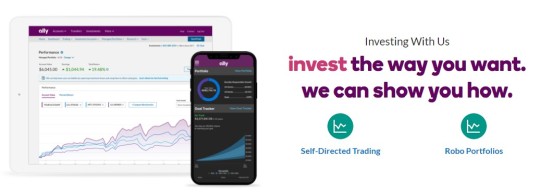
If you use Ally for your online banking, this might be a good investing choice for you. To create a Self-Directed Account, there is no minimum initial deposit. Ally Invest has a lot of tools that are both powerful and simple to use. A trading simulator and probability calculator are among the stock screener tools available for trading stocks and options.
Trades in stocks and exchange-traded funds (ETFs) are completely free. Options transactions are commission-free, however each contract costs $0.50. Access to the Managed Portfolios option is another reason to choose Ally Invest. Investors can split their account between a Managed Portfolio and a Self-Directed Account, where they can buy hand-picked equities and ETFs.
In addition, unlike other robot advisors, Ally Invest Managed Portfolios do not charge an advising fee. However, compared to other automatic investing applications, these portfolios have a greater cash balance.
6. Betterment
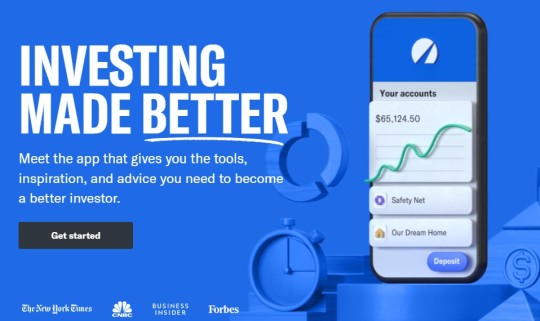
Because of their cheap costs, simplicity of use, and automated portfolio rebalancing, Betterment is one of the most popular "robot advisors.". They also provide free tax-loss harvesting. Betterment will strive to make tax-advantaged investments wherever feasible to limit your year-end capital gains to a minimum.
You simply need $1 to begin investing with Betterment. Betterment will invest in an ETF portfolio of stocks and bonds once you complete the first questionnaire, which assesses your investing goals and risk tolerance. As you become older and closer to retirement, Betterment will automatically move your portfolio allocation from stock-centric ETFs to more stable bonds.
Portfolios for socially responsible investment are also available. However, these funds charge greater costs than a traditional index fund approach.
The standard management charge is 0.25 percent of the entire value of your portfolio. Depending on the size of your initial contribution, you may be able to avoid paying management fees for a year.
7. Personal Capital
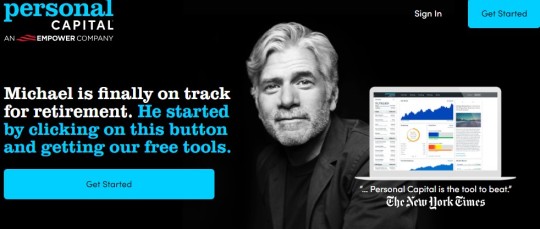
Personal Capital is a financial platform with two functions. Personal Capital's free budgeting software is used by many users to keep track of their spending and set financial objectives.
They also provide a free investment cost analyzer that analyzes your present investments and gives recommendations for low-fee funds that are similar. Personal Capital is also popular among those who want to keep track of their net worth.
You may invest with Personal Capital and get free access to a financial counselor if you have at least $100,000 to invest. Even if you don't have this much money to invest (yet), regardless of whatever brokerage you choose, you can track your existing investments for free.
Personal Capital might be the simplest method to view all of your money in one spot if you utilize many brokers.
8. Fidelity

Fidelity, which is one of the major online brokers, has a lot to offer.
For starters, taxable and retirement investment accounts have no account minimums. Children's investment accounts are also accessible.
It's free to trade stocks and ETFs, much like the other free investment applications. There's also a line of Fidelity ZERO index mutual funds with no fund or trading fees and a $1 minimum investment. Fractional investing is accessible for over 7,000 US equities and ETFs through the Fidelity mobile app. When using the Fidelity website on a laptop, investors must purchase entire shares.
Fidelity's analyst reports and research tools are another incentive to consider them. Many rudimentary investment applications just provide news headlines and graphing capabilities. Investors may access free third-party studies from well-known research firms while doing investing research with Fidelity.
Fidelity Go is a good option for those looking for a fully automated investing portfolio. This robo-advisor doesn’t charge an advising fee for account balances below $10,000.
9. TD Ameritrade

If you want powerful research tools, go at TD Ameritrade. With its online browser and mobile app, TD Ameritrade provides excellent charting capabilities and third-party analyst reports.
Its sophisticated trading platform, TD Ameritrade is available for free. Other brokers charge a premium for comparable services. Trades in stocks and exchange-traded funds (ETFs) are completely free. For both taxable and retirement accounts, there is no account minimum.
The TD Ameritrade teaching tools are beneficial to both new and seasoned investors. Short online videos and live webinars on popular investment subjects are available.
10. Public
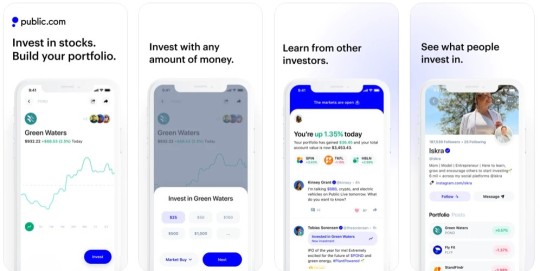
This app may appeal to you since it does not charge for order flow (PFOF) when you purchase or sell positions. Other free applications may charge a tiny fee to market makers, and as a result, you may not obtain the best trading price. This investment software comes with a variety of customizing options:
Limit and stop orders are advanced order types that allow you to only execute a deal at a particular price rather than the current market value. You may arrange your positions into short-term and long-term investment ideas using the portfolio organizer. The program provides a push message if you sell a long-term concept before keeping your shares for at least one year.
Investing themes: The service offers investing themes that can assist you in making informed decisions on environmental, social, and market developments. Community on the internet: Connect with other investors, view their portfolios, and talk with them inside the app to exchange investment ideas and perspectives. Education tools: Basic instructional tools can help new investors gain a basic grasp of how the stock market operates.
It can be an excellent platform for novice and seasoned investors who don't require the extra investment choices offered by traditional brokerages, such as mutual funds or CDs.
Summary Without having to pay trading commissions or account fees, anybody may invest and start earning compound interest. Popular financial applications, such as the ones listed above, may make investing easier and more convenient than ever before. A free investing app can assist you whether you're investing in stocks, ETFs, or real estate.
#investment#trading app#money management#vanguard#webull#m1 finance#robin hood#ally invest#betterment#Personal Capital#Fidelity#TD ameritrade#public
4 notes
·
View notes
Text
8 reasons why Social Media Marketing important for business?
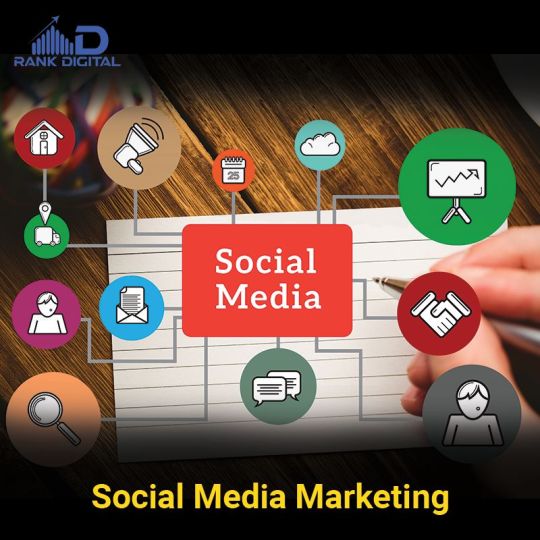
Social Media Branding Services has become the most influential and important virtual space, where the platform is not only used for social media but is also a great way to digitally advertise your brand and products.
The power of social media is commendable, as you can reach a large number of people within seconds of submitting an ad, helping you lower your costs and ensure your ads reach your potential audience with those ads. on social media.
With a large number of users online, representing almost 56% of the world's population, marketers should not miss the opportunity to market on these digital forums, where they can reach the maximum number of potential buyers compared to the media. printed or television.
Improve brand awareness
Social media is one of the most profitable and stress-free digital marketing platforms that can be used to increase the visibility of your business. To get started, create social media profiles for your business and network with others. Using a social media strategy will help you dramatically increase your brand awareness. Spending just a few hours a week, more than 91% of marketers said that their social marketing efforts significantly increased their brand visibility and improved the user experience. A social media site for your brand will certainly benefit your business and with regular use, it can also generate a large following for your business in no time.
Financially rewarding
For an advertising strategy, social media marketing is perhaps the most profitable medium. Creating an account and signing up is free for almost all social media platforms. But if you decide to use paid advertising on social media, always start small to see what to expect. It is important to be profitable because it helps you get a higher return on investment and have a bigger budget for other sales and marketing payments. By just investing a little money and time, you can dramatically increase your conversion rates and ultimately get a return on the money you primarily invested.
Pros and Cons of Social Media Marketing
Social media can be used for businesses of all sizes and is cheaper than any other marketing tool ever. You can use it for some users including:
Promote your brand and business name.
Talk to customers about your products and services.
Find out what consumers are saying about your business.
Attract new customers.
Build stronger relationships with existing customers.
Using social media has many benefits, but nothing is perfect. Social media marketing carries notable risks. These include several, including:
Time and money wasted with little or no tangible return
Rapid dissemination of the wrong kind of information about your company.
Incorrect information posted by you or negative reviews posted by others
It does not respect privacy, spam, and copyright laws.
Engaging attention
Social media is a great way to connect and communicate with customers. The more you communicate with your audience, the more likely you are to convert. Create two-way communication with your target audience so that their needs are known and their interest is easily met. In addition, communication and engagement with customers are one of the ways to capture their attention and convey your brand message to them. In this way, your brand reaches a larger audience in real terms and is effortlessly imposed.
Easily use advanced targeting opportunities
If these benefits sound good enough to you, but you're wondering if social media marketing is paying off, the answer is yes. Think about the amount of information that social platforms have about their users. They know each person's character location, gender, interests, and friends, among many other details. Since you can target users specifically on these topics, social media marketing can be extremely effective.
With platforms like Facebook and Twitter, you can choose to show your ads only to the most qualified demographic groups. This means that you only pay for extremely specific ads and you don't have to spend money showing your ads to users who are probably not interested at all. This is an extremely profitable method and another reason that shows the importance of social media.
Healthier customer satisfaction
Social networks play an important role in the networking and communication platform. When using these platforms, it is important to create a voice for your business to improve the overall brand image. Customers appreciate that when they post comments on your site, they receive a personalized response rather than a computer message. A brand that values its customers takes the time to create a personal message that is naturally presented in a positive light.
Market knowledge
One of the best ways to get to know your customers' needs and wants instead of communicating directly with them is to know the market. It is also considered the most valuable benefit of social media. By looking at the activity on your profile, you can see the interests and opinions of customers that you would not otherwise know if you were not present on social media. As an additional research tool, social media can help you gain insight and better understand your industry. Once you have a large number of them, you can use additional tools to find other demographic information about your consumers.
More brand authority
Brand loyalty and customer satisfaction play an important role in powering your business, but it's all about communication. When customers see your business posting on social media, especially answering questions and posting original content, it helps them build a positive image in their minds. Regular interaction with your customers shows that you and your business care about them. Once you have a few satisfied customers talking about their positive shopping experience, you can show your ads to real customers who appreciate your product or service.
Final words
There is no denying that social media marketing offers many benefits for startups and established brands. Regularly updating the correct social media marketing strategy will lead to higher traffic, better SEO, better brand loyalty, healthier customer satisfaction, and more. Your competition is already increasing day by day on social media, so don't let your competition take away your potential customers. The earlier you start, the faster you will see your business grow.
#Social Media Branding Services#social media brand management#Social Media Management#Social Media Advertising
2 notes
·
View notes
Text
The historic center of Puebla city, where I live, is a World Heritage site. Tphe nearby post office, like many buildings in the area, is beautifully decorated in the traditional tiles. But among theses buildings there is also a McDonald's, Dominos, Oxxo (a Coca Cola store), Subway, and Burger King, and there is a Pizza Hut, KFC; and Starbucks one block away.
Starbucks has 670 stores in Mexico, Subway has 900, and Walmart has 2,610—the largest number in any country after the US, and a figure that is likely to increase given their profits during the pandemic.
The impact of this change in urban landscape and consumption on Mexicans' identity, lifestyle, and culture, shouldn't be underestimated. More and more US transnationals have opened up in Mexico over the past few decades, taking advantage of unfair trade agreements, super-exploitative labor conditions, and cheap utilities. Local restaurants and traditional Mexican tianguis markets struggle to compete.
"There isn't any equality of conditions, so it isn't really a competition," says Iktiuh Arenas, an expert in urban planning and human rights, and a specialist with Mexico's Secretariat of Agrarian, Land, and Urban Development (SEDATU).
Arenas says shopping centers, department stores like Walmart, and transnational chain restaurants have advantages compared to local markets and craftspeople, because they have a big marketing budget. They encourage people to buy products that weren't produced locally, and they have the money to secure the best locations in squares and main streets.
Over the past few decades, he argues, "development" has been limited to building shopping centers and supporting chain stores, while green areas and museums have been deprioritized. "This policy of urban development is based on copying the US model," he says.
Walmart in Mexico (which operates as Wal-Mart de México y Centroamérica) is the biggest retailer in the country, and it includes other brands, like the smaller Bodega Aurrerra supermarkets, the wholesale Sam's Club, MaxiPali, and Superama. In 1994, it had just 25 stores in Mexico, but the NAFTA agreement (1994-2020) meant it could easily sell hundreds of products imported from the US, without paying customs taxes.
Since then, Walmarts have been built on forested areas, threatened buildings of artistic value, and been built on or near ancient ruins. There is a Walmart near the archaeological zone of Teotihuacán, and local resistance managed to prevent one being built in the Indigenous town of Cuetezalan.
Joining the Walmarts are hundreds of other companies, including Pepsico, Uber, 19,558 Oxxos, The Cheesecake Factory, Baskin Robbins, 718 Dominos, over 400 KFCs, Pizza Hut, Home Depot, Office Depot, Citigroup, JP Morgan Case, and thousands of factories, from Ford to General Electric.
With NAFTA's lifting of tariffs and trade barriers, these companies also benefit from some of the highest rates of exploitation in the world. While a Mexican worker in the US will earn US$1,870 per month on average, in Mexico the figure drops to US$291.
NAFTA also saw a mass displacement of rural workers in Mexico, and Arenas says public policy has abandoned rural areas in favor of cities. He argues that "classism and racism towards rural workers" has also been a factor.
I also talked to Isis Samaniego, a poet and traditional market worker, and an expert in native Mexican fruits and vegetables. "Department stores, shopping centers, and fast food joints from the US displaced local businesses here, like the tlapalerias [Mexican stores selling paint and hardware goods]," they say, arguing that those shops sold products that lasted, whereas the new shops sell cheaper, but lower quality goods.
As more and more farmers moved to the cities, they became the new cheap labor. Bertha Meléndez is a lifelong activist and well known musician. She sings in 10 Indigenous languages and researches and compiles Indigenous songs, while collaborating with community radios. She says the new arrivals to the cities were then sold the idea of junk food as a way to feel modern.
"It wasn't just a change of diet, but a change of lifestyle, as people left communities where there were strong connections between neighbors and a slower approach, and came to the cities where they were then so exploited that they didn't have time to prepare their own food," she says.
As she talks, we eat tortilla soup. "This is a Mexican dish," she says. "It takes time to prepare."
"People are abandoning the street markets and going to supermarkets because of the status … When a family goes to McDonald's, its because they want to look like they are upper class. People think the food is better there, but it has a lot of chemicals in it, it can be very addictive and bad for your health," comments Samaniego.
Many Mexicans feel the need to put on appearances. That involves pretending their living conditions are better than the poverty they face, as well as imitating US or European ways, and buying products or brands from there. For hundreds of years, colonization and imperialism have taught people that their culture and way of life were inferior.
Prior to the Spanish invasion, and well after it as well, people ate food according to the seasons, Arenas notes. "But now, Walmart sells products all year round, and so it breaks with the old way of doing things," he says.
He explains that producers compete for the privilege of Walmart shelf space, and consumers buy things they don't need as part of aspiring to be something better. "It strengthens those issues of classism and loss of identity," he says.
Before the Spanish invasion, people gathered in main squares and central areas and laid down woven petate mats, then arranged their products on them. They either exchanged goods, or sold them for cacao or for tools made of copper. These tianguis markets were a key part of people's culture and way of life, and they continue to exist in some form today in towns like Cuetzalan, Tianguistengo, Otumba, Tenejapa, Chilapa, Zacualpan, and more.
"In Walmart you exchange money with someone, but you don't exchange knowledge, you don't have a conversation," says Samaniego. But in the modern and traditional tianguis, you can talk to the farmers directly, or to the artists who made the handicrafts, they argue.
That's why Meléndez sees companies like Walmart and McDonald's as displacing communities, as well as their food and lifestyle.
"We are the children of corn. Since ancestral times, we have depended on corn," she says. She describes a relationship with the land and environment that is a key part of people's identities.
"Indigenous culture is alive, but it isn't as visible," she says. Some of the languages she sings in, such as Nahuatl and Mixteco, are widely spoken. But others are almost extinct, spoken by a few hundred people. Colonization, then US economic and cultural imperialism have seen people rejecting their indigenous roots, and "instead they imitate US culture. Being indigenous is stigmatized," she says.
That's why Meléndez sees her songs and Indigenous and Mexican art as being vital for people's sense of identity, and their visibility. There are 12 million professional folk craftspeople in Mexico. But they have been one of the sectors most negatively impacted by the pandemic. They often live in regions without Internet or phone signals, and frequently don't have the technical literacy to promote their products online—instead relying on interactions in the street and squares. During last year's lock downs, many artists were completely cut off from their income.
Stores like Walmart, on the other hand, have adapted to selling online. Walmart's profits in Mexico had increased to 162 billion pesos in 2020, from 148 billion in 2019.
"Mexico is dominated by the US … culturally, economically, and they even choose our presidents so that they can keep sending their companies here and enjoying cheap labor … and with that comes a policy of making people reject their culture, and that means rejecting themselves," Meléndez says.
Foreign corporations have a lot of freedom in Mexico, and they are backed by trade agreements like NAFTA and USMCA that were created within very unequal power dynamics. One activist, Gustavo Esteva during the 2002 protests against plans for a McDonald's in the main square of Oaxaca put it succinctly, "This is nothing less than a cultural conquest."
#🇲🇽#mexico#usa#united states#imperialism#colonization#racism#indigenous#native#puebla#puebla mexico#walmart#starbucks#mcdonalds#dominos#coca cola#NAFTA#NAFTA agreement#teotihuacán#teotihuacan#Cuetezalan#europe#spain#nahuatl#mixteco#USMCA#Gustavo Esteva#oaxaca mexico#oaxaca#burger king
1 note
·
View note
Text
How to Protect Your Business from Patent Infringement
Patents are a highly effective tool in the arsenal of most companies. They can act as an offensive and defensive weapon, allowing you to protect your innovative products and market yourself as a leader in your industry, while also preventing those who have stolen your technology from profiting off of it. But patents can also be costly. How do you make sure you're using them effectively? Here are a few tips that will help you keep your business safe from patent infringement.

1. What are patents, and why do you need them?
Patents are a set of exclusive rights granted by a government to an inventor to exclude others from making, using, or selling the patented invention for a limited period of time. The purpose of the patent system is to encourage inventors to disclose their inventions and to create a marketable product. A patented invention — or many inventions — becomes available for general consumption when a company decides to license the patent so that others may build upon it. This process is called reusing an existing technology. For Apple and Google this practice is built into the terms of service of each app. Users can download a foreign app and view the relevant terms of use agreement to determine what they can do, rather than being required to agree to Apple or Google’s terms. At this point, the recipient of the invented technology has no legal rights against others using it in their own commercial projects, and may distribute, sell, or reuse the invention to others without paying a royalty to the original inventor. Technology is subject to numerous complex regulations in terms of copyright, trademark, patent, industrial design, and trade secret laws. While these laws are designed to foster innovation, patent laws can sometimes have unintended consequences that diminish an invention’s value. In short, when certain laws operate in a way that impedes inventions from entering into the marketplace as broadly or as quickly as they might, impacts upon the price of technology and innovation are both magnified (or, in the case of patents, statistically possible) and can have a negative consumer impact on a very real level. Many patent holders fail to fulfill their legal obligations in this regard, which can ultimately make their patents, and those inventions they claim as infringements, invalid. Occasionally, patents cannot even file for infringement — these are known as non-implementation patents. Patent litigation costs a tremendous amount of money to both the plaintiff and the defense, and the result can be that a patent becomes effectively worthless.

2. How to protect your business from patent infringement
You can protect your innovations by filing a patent for them. The patent gives you the right to prevent others from making, using, selling or importing your invention without your permission. Patents last for 20 years and are granted by the government. They can be expensive and complicated to obtain, so it’s important to make sure you’re protecting your inventions. Protecting your invention from patent infringement can cost anywhere from a few thousand dollars to tens of millions of dollars. The best way to ensure the patent stays in your control is to ensure you properly assign responsibility for it. First, pay close attention to what steps are required because a patent may need to be renewed. If your invention has a marketable product, you should protect your invention with a patent yourself. Because patents tend to be implemented by large companies, it’s important to determine who will pay for them, before you implement them. This will ensure you’re not financially at the mercy of ‘patents trolls.’ Before assigning responsibility for a patent, analyze projects where someone is likely to infringe the patent. Enterprise, technology negotiations, or open source projects may pose problems. Large companies may be reluctant to make a financial investment without thorough investigation that could reveal weaknesses in your technology or a weakness in their patent portfolio. In these cases, work with patent attorneys to determine who will pay for a patent. Where you assign responsibility for a patent depends on your organization. For example, you may decide to have your engineering organization pay for all necessary patent applications and to pay for any renewal or modification of patents. Consult your legal department for legal guidance in your country. If your invention has a practical application, legal expertise will help you determine who must pay for patent applications and renewals. In applying for a patent yourself, you will generate evidence of its practical usefulness. In the United States, the “patentable subject matter” requirement determines who must pay for the patent application. This places the onus on the inventor to prove his invention is patentable.

3. What you must do to prepare for patent litigation
If you are sued for patent infringement, it is important that you test the validity of the patent. There are two main ways to do this: 1) you can challenge the validity of the patent prior to a lawsuit. This can be done by filing a patent re-examination request with the USPTO. 2) you can challenge the validity of the patent during litigation. Litigation can be challenging, which is why it’s a good idea to seek the court’s guidance before taking the first step. Patents can be an unreliable barometer of innovation, particularly in emerging technologies like biotechnology and computer security. Therefore, before you decide whether or not to file for a patent, make sure to advocate for its validity through third-party research, invest in appropriate patent counsel, and consider external expert witness statements. Protecting your company from patent litigation isn’t just about intellectual property. It’s also about protecting your reputation. Before suing a competitor for infringing on a patent, conduct your own internal research. Challenge the validity of patents in court, and speak with patent counsel to determine whether any patents may be infringing. Non-practicing entities (NPEs) are businesses that aren’t making a profit but are licensed to practice their technology. You have probably heard of such entities by their common trade names: a patent licensing company, a company that provides consulting services to biotech innovators, a company that provides x-ray machines to health institutions, or so on. Of course, this doesn’t mean these types of organizations have to be nefarious! Don’t make the mistake of labeling all NPEs “bad actors.” If you identify problems with patents, the company may develop proprietary or anti-competitive strategies to protect its business model. However, remember that other actors in the patent ecosystem are also trying to innovate and protect their intellectual property. Before taking on the role of steward of your business’ patent portfolio, you need to look first for problems that may be arising in the use of your intellectual property. When evaluating whether an NPE has infringed on your patents, consider identifying common grounds for disagreement.

4. How a patent attorney can help you win your case
If you’re in the midst of a lawsuit, it can be confusing to figure out how to proceed. To help you win your case, it’s important to get the right legal help. A patent attorney can help you win because they have the education and experience to evaluate your case and help you choose the best course of action. Technology is inherently dynamic and constantly evolving. Also, patents are one of the few types of intellectual property that is constantly subject to change, meaning that any issued patents can be revoked or modified by later patent applications, thus affecting the validity and enforceability of your patent. If your company is developing a technological innovation, having an expert such as a patent attorney on your side ensures that the patent process goes smoothly. The best way to determine the size of your patent portfolio and work toward securing those valuable patents is to communicate directly with the Patent Office. This can be accomplished by: Patents are granted by the U.S. Patent and Trademark Office (USPTO) to inventors who can show that their invention relates to something of existing importance. To file a patent — and receive an exclusive license to use and sell the patent — inventors must demonstrate the following three things: You may be able to save some money by licensing a patent instead of purchasing it. The process of applying for a patent can be time-consuming and costly, so it’s best to analyze whether it’s a good fit for your company and its products. Before you go to court, you should determine the value of your invention by comparing it to similar products. This process is known as comparing the patented invention with competing products. You’ll need to compile a list of the existing, similar products in the marketplace. Then devise a business model that would allow you to profit from these similar products. Patents can be very valuable, especially if you incorporate some of the technologies patented into your products. Check out the January Pro Patent Buying Guide to see how to determine the value of a patent.
#patent#patent uk#patent idea#patent idea uk#patent infringement#patent invention#albright i#albright ip uk#albright ip ltd#patent opposition#patents
1 note
·
View note
Text
capitalism
context: why does it make me cringe? why does sales make me cringe?
why did I feel for a while that I don’t want to get caught up in the career ladder?
why do I judge people who chase money or fame?
what should truly motivate us at work
In a perfect world, when it came to choosing an occupation, we would have only two priorities in mind:
– to find a job that we enjoyed
– to find a job that paid us enough to cover reasonable material needs
But in order to think so freely, we would have to be emotionally balanced in a way that few of us are. In reality, when it comes to choosing an occupation, we tend to be haunted by three additional priorities. We need:
– to find a job that will pay not just enough to cover reasonable material expenses but a lot more besides, enough to impress other people – even other people we don’t like very much.
– we crave to find a job that will allow us not to be at the mercy of other people, whom we may deep down fear and distrust.
– and we hope for a job that will make us well known, esteemed, honoured and perhaps famous, so that we will never again have to feel small or neglected.
reforming capitalism
The system we know as Capitalism is both wondrously productive and hugely problematic. On the downside, capitalism promotes excessive inequality; it valorises immediate returns over long-term benefits; it addicts us to unnecessary products and it encourages excessive consumption of the world’s resources with potentially disastrous consequences – and that’s just a start. We are now deeply familiar with what can go wrong with Capitalism. But that is no reason to stop dreaming about some of the ways in which Capitalism could one day operate in a Utopian future.
What we want to see is the rise of other – equally important – figures that report on a regular basis on elements of psychological and sociological life and which could form part of the consciousness of thoughtful and serious people. When we measure things – and give the figures a regular public airing – we start the long process of collectively doing something about them.
The man is indeed employed, but in truth, he belongs to a large subsection of those in work we might term the ‘misemployed’. His labour is generating capital, but it is making no contribution to human welfare and flourishing. He is joined in the misemployment ranks by people who make cigarettes, addictive but sterile television shows, badly designed condos, ill-fitting and shoddy clothes, deceptive advertisements, artery-clogging biscuits and highly-sugared drinks (however delicious).
We intuitively recognise it when we think of work as ‘just a job’; when we sense that far too much of our time, effort and intelligence is spent on meetings that resolve little, on chivying people to sign up for products that – in our heart of hearts we don’t admire.
Fortunately, there are real solutions to bringing down the rate of misemployment. The trick isn’t just to stimulate demand per se, the trick is to stimulate the right demand: to excite people to buy the constituents of true satisfaction, and therefore to give individuals and businesses a chance to direct their labour, and make profits, in meaningful areas of the economy.
This is precisely what needs to be changed – and urgently. Society should do a systematic deal with capitalists: it should give them the honour and love they so badly crave in exchange for treating their workers as human beings, not abusing customers and properly looking after the planet. A standard test should be drawn up to measure the societal good generated by companies (many such schemes already exist in nascent form), on the basis of which capitalists should then be given extraordinarily prestigious titles by their nations in ceremonies with the grandeur and thrill of film premieres or sporting finales.
There’s no shortage: we need help in forming cohesive, interesting communities. We need help in bringing up children. We need help in calming down at key moments (the cost of our high anxiety and rage is appalling in aggregate). We require immense assistance in discovering our real talents in the workplace and understanding where we can best deploy them (a service in this area would matter a great deal more to us than pizza delivery). We have unfulfilled aesthetic desires. Elegant town centres, charming high streets and sweet villages are in desperately short supply and are therefore absurdly expensive – just as, prior to Henry Ford, cars existed but were very rare and only for the very rich.
But we know the direction we need to head to: we need the drive and inventiveness of Capitalism to tackle the higher, deeper problems of life. This will offer an exit from the failings and misery that attend Capitalism today. In a nutshell, the problem is that we waste resources on unimportant things. And we are wasteful, ultimately, because we lack self-knowledge, because we are using consumption merely to divert or quieten anxieties or in a vain search for status and belonging.
If we could just address our deeper needs more directly, our materialism would be refined and restrained, our work would be more meaningful and our profits would be more honourable. That’s the ideal future of Capitalism.
In the Utopia, businesses would of course have to be profitable. But the success of a business would primarily be assessed in terms of its contribution to the collective good.
On changing the world
the only way to bring about real change is to act through competing institutions. Revolutions in consciousness cannot be made lasting and effective until legions of people start to work together in concert for a common aim and, rather than relying on the intermittent pronouncements of mountain-top prophets, begin the unglamorous and deeply boring task of wrestling with issues of law, money, long-term mass communication, advocacy and administration.
Our collective ideal of the free thinker is that of someone living beyond the confines of any system, disdainful of ‘boring things’, cut off from practical affairs and privately perhaps rather proud of being unable even to read a balance sheet. It’s a fatally romantic recipe for keeping the status quo unchanged.
We have to make what we already know very well more effective out there. The urgent question is how to ally the very many good ideas which currently slumber in the recesses of intellectual life with proper organisational tools that actually stand a chance of giving them real impact in the world. From a completely secular starting point, it can be worth studying religions to learn how to alter behaviour.
This is what religions have, for their part, excelled at doing. They’ve realised that if you put down an important idea on paper in somewhat pedestrian prose, it won’t have any lasting or mass impact. They’ve therefore, over their history, engaged the most skilled artists to wrap their ideas in the coating of beauty. They have asked Bach and Mozart to put the ideas to music, they have asked Titian and Botticelli to give the ideas a visual form, they’ve asked the best fashion designers to make nice looking clothes and they’ve asked the best architects to design the most impressive and moving buildings to give the ideas heft and permanence.
We should use the history of religion to inform us about the role of repetition, ritual and beauty in the name of changing how things are.
There is a great deal of large-scale ambition in the world, but all the largest corporate entities are focused on servicing basic needs: the mechanics of communication, inexpensive things to eat, energy so we can move about. While our higher needs – for love, beauty, wisdom – have no comparable provision. The drive to grandeur is missing just where we need it most.
Good business
So, inevitably, businesses will evolve to profit from their wishes. Capitalism has not traditionally been interested in whether these are sensible, admirable or worthy desires. Its aim is neutral: to make money from supplying whatever people happen to be willing to pay for.
Philosophy, by contrast, has long recognised a crucial distinction between desires and needs:
A desire is whatever you feel you want at the moment.
A need is for something that serves your long-term well being.
And it’s our needs that are required for a satisfying, fulfilled life (which Plato, Aristotle and others call a life marked by eudaimonia).
Capitalism goes wrong when it exploits this cognitive flaw: large numbers of businesses sell us stuff that we desire but which (in all honesty) we don’t need. On longer, calmer reflection we’d realise those things don’t actually help us to live well.
Sadly, it’s easier to generate profits from desires than from needs. You can make much more money selling bad ice cream than by marketing Plato’s dialogues.
In a utopia, good businesses should be defined not simply by whether they are profitable or not; but by what they make their profit from. Only businesses that satisfy true needs are moral.
Good capitalism requires that we address two, core educational needs. Getting us to focus on what we really need, what the real challenges in our lives are. And getting us to focus on the value of particular goods in relation to our needs: that is, how do these particular purchases help with eudaimonia?
So, in search of a better economy, we should direct our attention not simply to shopping centres and financial institutions, but to schools and universities and the media. The shape that an economy has ultimately reflects the educated insights of its consumers. When people say they hate consumerism, what they often mean is that they are dismayed at peoples’ preferences. The fault, then, lies not so much with consumption as with the preferences. Education transforms preferences not by making us do what someone else tells us. But by giving us the capacities and skills to understand more clearly what we genuinely do want and what sort of goods and services will best help us.
tbc
5 notes
·
View notes
Text
Afterthoughts from Re-wiring Distribution Networks
Last week, I had the privilege of joining my friend Karin Chien in a conversation on "Re-Wiring Distribution Networks" hosted by The International Documentary Association as part of their Getting Real Now summer series.
I'm excited to join my friend + award winning independent producer and distributor @producerkarin for a conversation this Thursday hosted by @IDAorg as part of their #GettingRealNOW series. RSVP in the link below in the thread. https://t.co/kgxPy9bA21
— Gary Chou (@garychou) August 26, 2020
A video should be posted on YouTube shortly for all to see.
Upon reflection, there were a few points I'd like to emphasize, if not re-state altogether:
Everything is changing. The installation of large-scale, ubiquitous, real-time information networks is the single most impactful development in our lifetimes. It's not just affecting distribution networks or business models, it's affecting society and culture. As such, it's worth thinking about the ways in which we, as individuals, need to change in order to adjust to this.
Attention is now the scarce resource. Advances in technology have lowered barriers to participation—which is great for everyone—but it also means that competition for our attention has never been greater. What used to work in a world of surplus might not be viable anymore. This is a good post to read for more background.
What are the networks that you need? You're going to need access to different networks of people for different things (i.e. your collaborators aren't necessarily your financiers or your friends or family). If you lack sufficient access to relevant networks, consider whether the immediate work you produce be something intentionally designed to help you gather the people you will need for your journey vs. focusing solely on your creative vision.
Signaling helps your network find you. If the network you need doesn't exist, you'll need to consider forming it yourself, through a committed, regular practice of signaling. What is something you can regularly and sustainably share that is of interest to those who are best positioned to support you? This could be as simple as starting a blog or newsletter, or it could be as elaborate as a speaker series or a club. As this is really hard work—particularly for creators who are under-networked—it's a prime opportunity for foundations, intermediaries and other support organizations to operationalize and/or specifically fund.
Collective action can take on many different (new) forms in a networked world. We're still in the early stages of understanding how to wield the power afforded by networked systems and there's tremendous opportunity for creativity here. In addition to Tracy Chou's work mentioned on the call, which resulted in greater transparency in the tech industry, there are other interesting collective efforts like the Letters for Black Lives project, which brought together hundreds of strangers to coordinate mass translation efforts; as well as efforts to include diversity riders in term sheets.
Q&A Redux
Finally, there was a question posed towards the end of the Q&A session that I'd like to revisit, as my initial response zeroed in too narrowly on the topic of online advertising, which wasn't really the point, and it's a rather pertinent question:
When we think of distribution, we usually think of mass, untargeted distribution always hoping to expand our audiences. Can the panelists talk about distributing to more specific, pre-inclined audiences but using the worldwide network afforded to us by the interwebs, perhaps akin to how big tech companies use granular algorithms to target ads?
Here's what I would have liked to have said:
I'd reframe this question slightly—instead of thinking about how the big tech companies have leveraged this infrastructure, I'd look at how tech entrepreneurs have adapted to the changes in the environment as a result of the installation of these networks (which are the same problems we talked about in the conversation).
What's changed for tech entrepreneurs is that there's now an abundance of:
free information and educational resources contributing to an increasingly global trained labor force
free open source tools and frameworks which make it easier and faster to build applications
easy access to cloud hosting providers which make it possible to deliver and scale your application globally and instantly
global capital willing to fuel new ideas, good or bad.
All of this has resulted in an unprecedented amount of competition (and innovation) chasing a limited amount of attention. Thus, the hard thing about building a software business is no longer the software, it's the distribution—how you get in front of people who are likely to want your product, and how you get them to pay while fending off all of the competition.
We've seen two different strategies emerge, which depend upon how well-funded a company is.
If you're immensely well-funded and you have a product or service with good unit economics (meaning that you make money on every sale, unlike Moviepass), you can afford to raise a lot of capital and spend it on online advertising to acquire customers, and then re-invest your profits into even more online advertising and continue to grow until you can't.
But, the majority of businesses aren't immensely well-funded and so they can't run this playbook and spend their way to success. So, they've had to adopt a slower and more modest 3-part strategy in order to grow:
Find or gather a community of people who you hope to serve, and gain their trust / get them to care about you.
Set aside your grand vision, and instead build something small and focused (commensurate to your cost structure), which is compelling for this community.
Collect and share stories of success from your community and repeat step 2, incrementally expanding the size/scale/footprint of your vision each time you do so.
The core difference between these two strategies is the order of operations. Rather than trying to find more people (i.e. customers) for your stuff, it's about building stuff for your people. In essence, the marketing comes before rather than after.
What this means for filmmakers is two-fold:
First, instead of targeting audiences after you've made your film, focus on gathering allies before and while you make your film. Having more allies doesn't guarantee you success, but it increases the likelihood of unlocking new resources and paths as you move forward.
This doesn't mean you need to become yet another ostentatious internet influencer or turn your project into a reality TV show, nor does it mean you need to take on a second job as a promoter or marketer.
There's always a story behind the film's story: who you are and why you're choosing to spend your precious time working on this project. Often, this story unfolds over the course of the project itself. And so, there's a lot of value to be had simply by adopting a practice of working in public—publicly sharing the exhaust of your process: your artifacts, your lessons, your story—and enabling people to learn along side you.
There are a lot of practical reasons that drive secrecy in filmmaking, but I'd argue that these only benefit the existing gatekeepers. And certainly, if you're asking about how to fully leverage the value created by this internet infrastructure we're all stuck with, the system is designed to favor openness. (Pre-internet, startups commonly embraced secrecy by working in "stealth mode", and this cultural norm has flipped as well.)
Second, create a space that is intentionally designed to welcome these allies into your circle and where you can sustainably keep them engaged over the long term. The simplest space is an email newsletter, but this could be something more elaborate like a club. Consistency is better than frequency, and ideally, there's an opportunity for your allies to see each other and not just you.
(If we stick with our example of a newsletter this could mean that you're not only sharing your thoughts and stories, but that you're also inviting them to contribute questions and comments, perhaps monthly or quarterly.)
There's a tremendous opportunity here to get creative, and while it may initially seem like an onerous chore by itself, in the context of your broader career aspirations, this will increase the surface area of your optionality so long as you continue to tend to your garden.
And so, rather than leverage this new internet infrastructure simply to target the masses in the hopes of consummating a transaction, I'd take advantage of its ability to connect people, globally, in meaningful ways at virtually zero cost to form new networks—or gardens—around you and your practice.
But it won't be an easy shift because done right, it will require a different way of working.
The upside, however, is the ability to change the equation in this discussion around re-imagining distribution networks (and models) from a conversation about what a collective of individual filmmakers can do to a conversation around what a cooperative of gardens can support and grow.
Originally posted: https://garychou.com/notes/thoughts-from-re-wiring-distribution-networks/
9 notes
·
View notes
Text
Watch the new documentary Fake Famous, it exposes Valery’s sorry ass and the common liars like her. How they scam people by buying followers, likes, comments, fake fan accounts, bots to spread their bs, how they edit and manipulate on the internet, faking to lead a luxury lifestyle to create envy, Kiseleva Kaufman like all these lowlives also uses photoshop, filters, plastic surgery, fake cosmetic enhacements, and her biggest way to fool for gain is pretending about JL, pretending to be with him, pretending wearing his clothes, pretending to be his girlfriend, all fake, online bullshit. These fakers are on their way down their nasty trickery is becoming more and more mainstream.🤢
————————————–
https://twitter.com/HodaAndJenna/status/1357711789111316481?s=20
————————————–
https://collider.com/fake-famous-review-hbo-documentary/
”A documentary exploring how young people are desperate to be famous and will chase that fame on social media platforms seems ripe for a dark, bleak narrative, and yet director Nick Bilton didn’t really find that in his movie Fake Famous. A technology journalist making his feature debut, Bilton decided to explore what “fame” means in the age of social media, and why so many are coveting that fame when what qualifies as success can be easily manipulated through widely available tools. Through three protagonists, Bilton wryly shows the emptiness of a perfect Instagram life and perhaps provides a worthwhile lesson to wannabe influencers that the Internet fame game isn’t all it’s cracked up to be.
Bilton sets out to create a social experiment. He has a casting call where about 4,000 wannabe famous people show up (mostly people who are model/actors), and he whittles that down to three subjects. There’s Dominique Druckman, who’s an actress working in retail, fashion designer Chris Bailey who also works in retail, and Wylie Heiner, who doesn’t seem to have a personal career goal, but doesn’t really like this current job working as a personal assistant to a real estate developer. Bilton then sets to making each of them “fake famous”, first by buying followers and then by purchasing fake engagement from these bot armies. He also stages photo shoots to give followers (both real and fake) a look at a glamorous lifestyle. Bilton’s hypothesis is that these three people will obtain influencer status, which will in turn yield tangible results like free products and even expensive paid vacations.
My personal hypothesis was that this taste of fame, no matter how artificial, would turn these three regular people into total monsters, and to my great relief, that’s not what happened. Dominique, Chris, and Wylie are basically just people in the early 20s—they want to be famous because they’ve been told that fame is good, and now through their phones they’re getting a constant stream of influencers showing off a lavish lifestyle that’s the result of being “famous” through no accomplishment other than amassing follows, likes, and engagement. All three protagonists seem to be kind of in on the joke, but they also come to three different realizations about the social media economy.
For Bilton, his larger point is how artificial the whole structure is and that there are no incentives to create anything past the artifice. To provide an example of how bizarre this whole endeavor is, Bilton buys bots to increase follows and engagement to create the appearance that his subjects are real influencers. This leads to real rewards like companies wanting to use these influencers to sell their products. But a substantial portion of the followers are bots, and the software meant to call that out is apparently also fraudulent, so there’s no way for companies to know if these influencers are having a real impact in hocking products despite the exorbitant costs wooing these influencers. To put it another way, a company will spend thousands of dollars to ask Dominique to sell some fashion or jewelry, and Dominique will do it and it’s being sold to an audience primarily composed of bots. In some ways, it’s very Black Mirror, but in other ways it’s kind of silly where the real victims are the PR firms and companies so desperate to make a sale that they can’t even distinguish if their potential customers are real or fake anymore.
To Bilton’s credit, he also acknowledges that the influencer culture is not just one thing, and that while it may be built on dubious engagement, there are other times where activists have used the platform to try and effect change. Furthermore, why it’s sad that so many young people want to be famous, there’s a “same as it ever was” element to that desperation. An early chart shows that young people in previous decades wanted to grow up to be pro athletes, but I’m willing to be that a part of that desire was that pro athletes are famous and well paid, and now there’s a way to be famous and well paid without having to be athletic. Yes, there are obvious dead ends here where we have to reckon with self-obsession and the constant need to create a feeling of inadequacy in others to justify our own existence, but Fake Famous wisely sidesteps those questions of existential dread since it would only be a rabbit hole into total despair.
The trick of Fake Famous is that it isn’t trying to bum its audience out, but rather educate them on how there’s really no need to chase Internet fame because it’s simply is not real. While you may be able to squeeze some swag out of it, but to attempt life an influencer is full-time job and one that seems fairly unrewarding if you’re constantly having to promote the fruits of your labor. Hopefully, Fake Famous may serve as a wakeup call to younger viewers by showing that while social media can be fun, once you peek behind the curtain, fame is not only fleeting, but in the 21st century, it can be completely artificial.”
————————————————
https://amp.cnn.com/cnn/2021/02/02/entertainment/fake-famous-review/
“(CNN)"Fake Famous” offers a novel window into the world of influencers, conducting an experiment to see if three young wannabes can be transformed into marketing dynamos. While their tales don’t unfold entirely as planned, the HBO documentary exposes how ripe for manipulation this whole culture is, and the powerful incentives to game the system.
Written, produced and directed by journalist Nick Bilton, “Fake Famous” charts the evolving currency surrounding fame, which once rewarded those renowned for a skill – think actors and athletes – before reality-TV stars became famous for being famous, and finally social-media “stars” celebrated “simply for a number” – that is, their collection of followers.
Bilton begins by interviewing candidates – mostly aspiring actors and models – choosing three to travel the road to fame. The tricks of the trade include buying followers (7,500 for the cool price of $119.60), renting a mansion to stage glamorous photo shoots and style makeovers in order to look like the cool kids.
If that all sounds a bit cynical, that’s really the whole point, given the fraud and fakery built into the “follower” model. Those totals regularly get padded by bots, Bilton explains, “making people appear more popular than they really are.”
As Bloomberg reporter Sarah Frier notes, the whole premise behind influencers hinges on “presenting a lifestyle that people want to mimic.” It’s a marketing approach built on envy, emphasizing perks associated with that to pitch products while allowing the “stars” to cash in on those relationships.
The way people bend that formula to their advantage is an inevitable byproduct of social media, where, as cultural critic Baratunde Thurston puts it, “We’re all making our own movies, and we’re trying to be the star.”
Influencers, however, can elevate those vaguely narcissistic impulses to a different level. Despite the often misleading nature of the images, Bilton points out that it’s in “no one’s best interest” – certainly not those reaping the benefits, including the companies involved – to acknowledge how much of that is manufactured and fabricated.
The main takeaways aren’t just the deception baked into the whole process, but the consumerism at its core – designed not to make people feel better, Bilton suggests, but rather to “make you feel worse” about what you don’t have.
Tellingly, the making of the film overlapped with the outbreak of coronavirus, which actually bolstered the influencer game, creating a ready audience of people with extra time at their fingertips to spent ogling the lives of others.
At a time when the inability to separate fact from fiction has become a dangerous problem for democracy, “Fake Famous” illustrates just how easily those lines are blurred – less for power, in this case, than for fun and profit.
“Fake Famous” premieres Feb. 2 at 9 p.m. ET on HBO"
***
Jeez, anon...
That was a looooong post! I´m sorry but I just lost track of what we we were meant to learn here...
I assume smthg about how fake VK is in which case... meh. Sorry but not interested.
1 note
·
View note
Text
12 Minute Affiliate System Review: This Is What I Got!
by shivansh bhanwariya
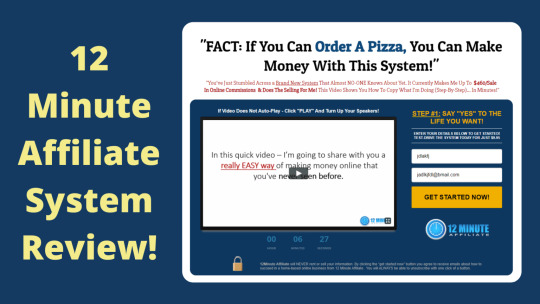
You just heard about the ‘12 Minute Affiliate System‘ through a YouTube video, blog, or a social media advertisement or post.
Looks both interesting but a bit risky. I know that feeling. I had the same feeling when I got the chance to look at it back in the day.
But, then I also realized that it is run by Devon Brown. If you’re a ClickFunnels user, you might know that this guy has showed up at FHL (Funnel Hacking Live) a couple times.
Still not sure, this is that guy…
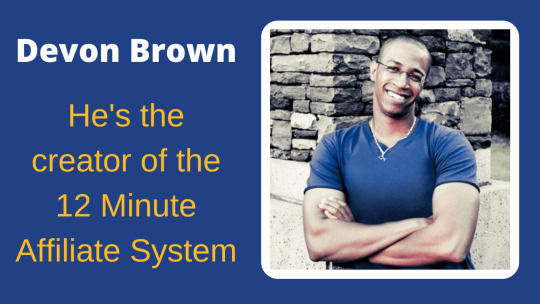
When I got to know that he runs the 12 Minute Affiliate System, I finally decided to try this out. I’ll be sharing everything I liked and didn’t like about the program/system after spending some time figuring stuff out.
I’ll share what it looks like inside to be a member, what is this all about, how user friendly is the training, the set-up, and who is this program for.
Let’s kick things right away and start this ONLY in-depth 12 Minute Affiliate System review without wasting any time.
What is 12 Minute Affiliate System?
So what this actually is?
Is it a training program?
Or a kind of machine that’ll generate you thousands of dollars in minutes?
The truth is, it’s an affiliate marketing training program with actionable and easy steps that beginners can leverage to make money online without having to start a website, YouTube channel or something else.
They provide you everything you need. From training to funnels, from products (that you choose) to traffic, and nifty support.
Since you just have to copy and paste the steps provided (I’ll talk about them in a while), you can probably call it a system.
I’m a member of the program and this is an inside view of the program.
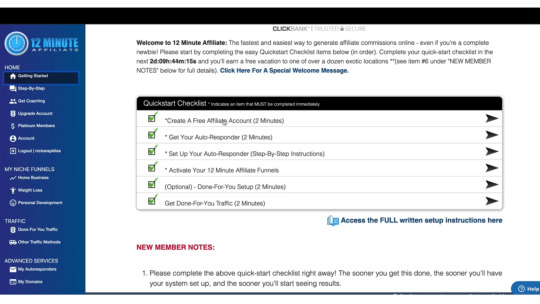
You get a whole bunch of stuff when you enter this program. But before we talk about that, let me answer some of the big questions.
Does it Really take 12 Minutes to Get Started?
The answer is yes and no. Sure, you can have the funnels, autoresponder, and tracking set up, but that doesn’t mean you’ll starting making money within 12 minutes. It’s going to take a while before you start earning commissions because all you’ll do is affiliate marketing.
Affiliate marketing takes a bit of time, a little work, and some investment to get going in the right direction.
It’s not a ‘get rich quick scheme’ for sure. Also, if you’re looking for something like that, no training or even system will work for you because it simply doesn’t exist.
There’s no shortcuts to success. I would not even recommend you reading this review if you want to make $100,000 within this week.
That’s not how it works.
Can you Earn Four to Five Figures each Month?
Hell yeah! But……
Okay, so what’s the catch?
Well, it’s investment and work. You’ll want to invest a bit into your skills and advertisements to get some quality traffic and coming in and once you have that up and running, you can get a chance to lay in the bed and generate passive cash flow.
Is 12 Minute Affiliate Legit?
I have a simple answer for this question: Yes, It’s Legit for sure!
How Does the System Work?
So, when you’re in the system, there are total 6 steps you need to take to start making the profit or in other words, start your online business model. Let’s go over them one after the other.
Step #1: Create your Affiliate Account in 2 Minutes
This is the first step that you get to meet when you initially login to the system. You want to create/setup an affiliate account first.
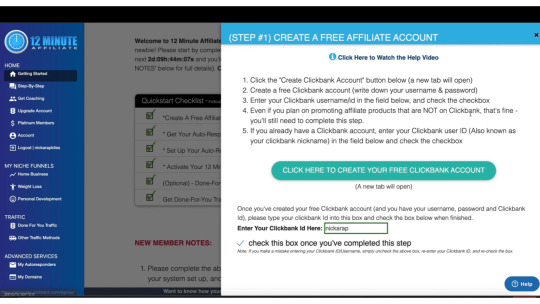
It’s a very easy step to be taken. You create a ClickBank affiliate account so that you can be an affiliate of a product to be able to promote it, make sales, and earn commission off of that.
It’s nothing complicated. You might already have a ClickBank account if you’ve tried selling somebody else’s products as an affiliate.
There are plenty of resources taking you from baby steps to be able to create an affiliate account.
It’s pretty easy and basic.
Step #2: Get an Autoresponder
If you don’t know what an autoresponder is, it’s a tool that allows you to send automated emails to your subscribers without you having to worrying about sitting like a crazy person and sending tons of emails to tons of people.

The software recommended by the 12 Minute Affiliate System is AWeber. Just be aware that you’ll need to buy the tool yourself. For the first 30 days, it’s going to be free and then it’ll cost $19 per month (for 500 subscribers).
But it will outsource a whole lot of your work. It’s worth paying. Also, according to industry average, you’ll be earning close to $500 per month when you reach that 500 subscriber mark.
Majority of the people earn $1 for an email subscriber per month. You could be earning more as well – depending on the quality of the list and the strategies you use.
We’ve been using AWeber lately and really love the way it works. Nice deliverability, user experience, and overall tracking. It’s not the only best tool but we just live the company so much.
If you don’t want to use AWeber, you’ll be free to integrate an autoresponder of your own. No worries with that.
Step #3: Setup your Autoresponder
In this step, you’ll be loading email swipes to your AWeber or any other email marketing platform. In 12 Minute Affiliate, you’ll be getting 80 email swipes that you can simply upload to your account easily and then you’re up and running.
That’s why they recommend AWeber because it’s going to be easy for you to get this task done in minutes. It’ll be convenient to send emails series.
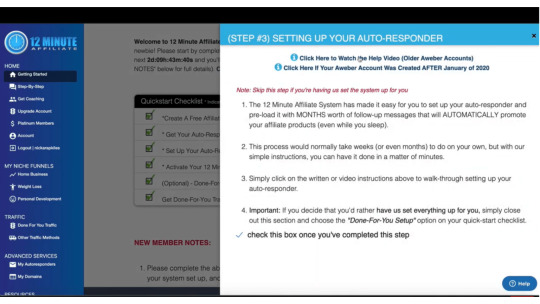
You will be able to auto generate emails with your own affiliate links and then have them sent to the subscribers on a daily basis.
Just like – Email #1 – On day 1, Email #2 – On day 2, Email #3 – ON day 3, and so on.
I personally think that sending 80 emails is a bit aggressive.
Step #4: Active your 12 Minute Affiliate Funnels
As shown below, in this step, you’ll be placing your affiliate ID (depending on the niches you choose). These funnels are included within your account and you won’t need a website or a sales funnel software like ClickFunnels.

You can pick up any (done for you) template shown in the library to promote various products in different niches you chose.

It’s just a matter of clicks, and I mean it.
If you don’t want to do it by yourself, you can pay to play. They have a Done For You setup that can be helpful if you don’t have much time.
Step #5: Get Traffic
Here, you have two ways to go. One, get traffic by the traditional ways like web forums, SEO, YouTube, and other stuff which takes some time. You’ll get this e-book + training for the traffic.
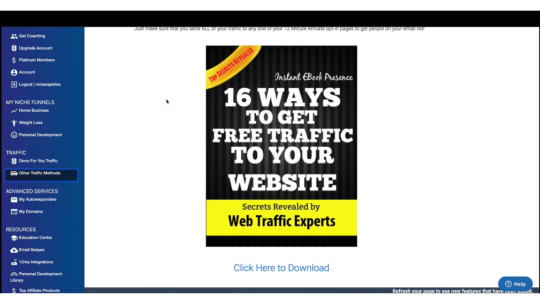
Or in the second option, there Done For You Traffic.
Really?
Well, here, you’ll be buying clicks and they’ll setup everything for you. Depending on your industry, it can cost anywhere from $1 per click to $3 per click or more.
Hence, if you pay $100, there’ll be about 100 people coming to your landing page. It’s just an example.
But let me be clear, if 100 people hop on to your page, you won’t be seeing 100 signups to your mailing list.
The average conversion rate will about 25 to 30% (sometimes more or less). That said, if you get 100 people coming in, and you get 30 signups, you can expect one or two sales of the product.
So, if it’s a high ticket product, you can spend $100 and make $500, $600, or even $1,000 back. But if it’s a low ticket product, you’ll barely breaking even.
Affiliate marketing is not magic. It requires work, patience, and investment – just like other business models out there.
So, there are the simple steps the 12 Minute Affiliate System offers. It really doesn’t take much of your time to get started if you’re willing to.
Is there Anything else you Get?
Yes, they also have a section for personal development, which I think is really important for a person to stay positive unless he starts getting/seeing some good results. Business is all about patience regardless it’s an online or an offline business.
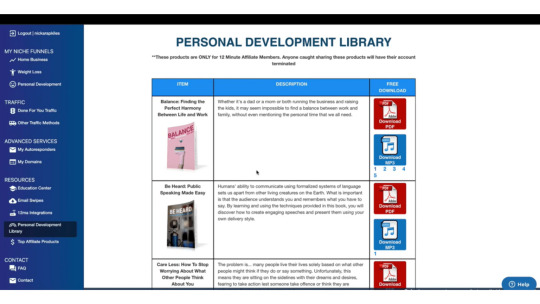
The way you think about your life is super important. Mindset is everything.
If you change the way you look at things, the things around you will change.
Cool, are there Any Upsells?
Yes, there are upsells. But those upsells don’t have to do anything to you when you’re just beginning the journey. You can upgrade your account and get high level coaching once you start generating some decent revene.
That’s why, I don’t talk about upsells in this review.
What About the Money Back Guarantee?
The 12 Minute Affiliate System offers a 60-day money back guarantee so you won’t need to worry about that as well. It’s risk free to join.
My Final Verdict on 12 Minute Affiliate
Overall, the product is super amazing and provides a whole lot of value that it promises. However, I’m not a big fan of a product that does everything for you. Like you don’t earn any skills when you buy these kind of systems.
Sure, it can generate you money. And that’s cool. But I personally think that high income is not that important to lead…rather, a high income skill is something that you should choose.
But hey, everybody’s got different perspective about life. Some want more time. Some want freedom. Some want houses. Some need fame. And the list goes on and on and on.
Finally, I can say that this system is not a cringe or a scam. It’s legit and fits best for beginners trying to make money online.
This was my personal experience after purchasing the system myself to help you out with a better context.
Give it a try and let me know how it goes.
Click Here To Join The 12 Minute Affiliate System Now!
So, this was my honest 12 Minute Affiliate Review that I wanted to share with you all. If have any questions, let me know in the comments section right below and I’ll make sure to clear your doubts.
#online make money#earn online money#affialate marketing#work from home#how to make money#clickbank#how to make money online#amazon affiliate#affiliatenetwork#make money as an affiliate#affiliate meaning#affiliate program#commission junction#affiliate definition#what is affiliate marketing#best affiliate marketing guide#best affiliate program#affialate marketing for beginners#earn money#earn money online#online make money for begnniers
2 notes
·
View notes
Text
Privacy Without Monopoly, EU edition

Tech monopoly apologists insist that there’s something exceptional about tech that makes it so concentrated: “network effects” (when a product gets better because more people use it, like a social media service).
They’re wrong.
Tech is concentrated because the Big Tech companies buy up or crush their nascent competitors — think of Facebook’s predatory acquisition of Instagram, which Zuckerberg admitted (in writing!) was driven by a desire to recapture the users who were leaving FB in droves.
Google’s scale is driven by acquisitions — Search and Gmail are Google’s only successful in-house products. Everything else, from Android to Youtube to their entire ad-tech stack, was once a standalone business that Google captured.
Monopolies extract monopoly rents — like those delivered by Googbook’s crooked ad-tech marketplaces, or Apple/Google’s 30% app shakedown — and use them to maintain their monopolies. Google gives Apple billions every year so it will be the default Ios and Safari search.
These are the same tactics that every monopolist uses — high-stakes moneyball that creates a “kill-zone” around the monopolist’s line of business that only a fool would try to enter. Tech DOES have network effects, but that’s not what’s behind tech monopolies.
We see monopolies in industries from bookselling to eyeglasses, accounting to cheerleading uniforms, pro wrestling to energy, beer to health insurance. These monopolies all follow Big Tech’s template of mobilizing monopoly rents to buy or crush all competition.
The differences between the anticompetitive tactics that monopolized these industries are largely cosmetic — swap out a few details and you might well be describing how John D Rockefeller and Standard Oil monopolized the oil markets in the late 19th and early 20th centuries.
Big Tech does have network effects, but these are actually a tool that can be used to dismantle monopolies, as well as maintaining them. Network effects are double-edged swords: if a service gets more valuable as users join, it also gets less valuable as users leave.
If you want to understand the anticompetitive structure of the tech industry, you’d be better off analyzing switching costs, not network effects. Switching costs are the things you have to give up when you leave a service behind.
If your customers, community, family members or annotated photos and other memories are locked up in Facebook’s walled garden (or if you’ve got money sunk in proprietary media or apps on Apple’s, etc), then the switching cost is losing access to all of that.
Here’s where tech really is different: tech has intrinsically low switching costs. Latent in all digital technology is the capacity to interoperate, to plug a new service into an old one, to run an old app inside a simulator (“runtime”).
There’s no good technical reason you can’t leave Facebook but take your treasured photos with you — and continue to exchange messages with the people you left behind.
True, Facebook has gone to extraordinary lengths to keep its switching costs high, deploying technical countermeasures to block interoperability. But these aren’t particularly effective. Lots of people have figured out how to reverse-engineer FB and plug new things into it.
Power Ventures created an app that aggregated your FB feed with feeds from rival services, giving you a single dashboard. NYU’s Ad Observer scraps the political ads FB shows you for analysis to check whether FB is enforcing its own paid political disinformation rules.
And there’s a whole constellation of third-party Whatsapp clients that add features FB has decided Whatsapp users don’t deserve, like the ability to block read-receipts or run multiple accounts on the same device.
https://www.eff.org/deeplinks/2020/03/african-whatsapp-modders-are-masters-worldwide-adversarial-interoperability
Most of these are technical successes, but they’re often legal failures. FB has used the monopoly rents it extracted to secure radical new laws and new interpretations of existing laws to make these tactics illegal.
Power Ventures was sued into oblivion. Ad Observer is fighting for its life. The Whatsapp mods are still going strong, but that may be down to the jurisdictions where they thrive — sub-Saharan Africa — where FB has less legal muscle.
With low switching costs, much of FB’s monopoly protection evaporates. Lots of people hate FB, and FB knows it. You’re on FB because your friends are there. Your friends are there because you’re there. You’ve taken each other hostage, and FB benefits.
With low switching costs, you could leave FB — but not your friends. The kill zone disappears. All we need is interoperability.
Enter the EU’s Digital Services Act and Digital Markets Act, proposed regulations to force interop on the biggest Big Tech players.
The EU has recognized that mandating interop can reduce switching costs, and reducing switching costs can weaken monopoly power.
Some critics (like me!) of the EU proposals say they don’t go far enough, asking for “full interop” for rival services.
Against these calls for broader interop come warnings about the privacy implications of forcing FB to open up its servers to rivals. It’s hard enough to keep FB from abusing its users’ privacy, how will we keep track of a constellation of services that can access user data?
Last Feb, Bennett Cyphers and I published “Privacy Without Monopoly,” for EFF, describing how interoperability can enhance privacy.
Interop means that users can choose services that have better privacy policies than Facebook or other incumbent platforms.
https://www.eff.org/wp/interoperability-and-privacy
But in theory, it means that users could choose worse services — services that have worse privacy policies, services that might be able to grab your friends’ data along with your own (say, the pictures you took of them and brought with you, or their private messages to you).
That’s why, in our paper, we say that interop mandates have to be backstopped by privacy rules — democratically accountable rules from lawmakers or regulators, not self-serving “privacy” limitations set by the Big Tech companies themselves.
For example, Facebook aggressively imports your address books when you sign up, to connect you to the people you know (this isn’t always a good experience — say, if your stalker has you in their address book and automatically gets “friended” with you).
If you try to take your address book with you when you quit, FB claims your contact list isn’t “yours” — it belongs to your contacts. To protect their privacy, FB has to block you from exporting the data — making it it much harder to establish social ties on a new service.
It’s not obvious who that contact info “belongs to” (if “belong to” is even the right way to talk about private information that implicates multiple people!).
But what is obvious is that Facebook can’t be trusted to make that call.
Not only has Facebook repeatedly disqualified itself from being trusted to defend its users’ privacy, but it also has a hopeless conflict of interest, because privacy claims can be used to raise switching costs and shore up its monopoly.
In our paper, Bennett and I say that these thorny questions should be resolved democratically, not in a corporate boardroom.
Now, as it happens, there’s a region where 500M people are protected by a broad, democratically enacted privacy law: Europe, home of the GDPR.
Today, in a new appendix to “Privacy Without Monopoly,” EFF has published “The GDPR, Privacy and Monopoly,” my analysis of how the GDPR makes interoperability safer from a privacy perspective.
https://www.eff.org/deeplinks/2021/06/gdpr-privacy-and-monopoly
Working with EFF’s Christoph Schmon and Bennett Cyphers, we develop a detailed analysis of the GDPR, and describe how the GDPR provides a lawful framework for resolving thorny questions about consent and blended title to data.
The GDPR itself seeks to promote interoperability; it’s right there in Recital 68: “data controllers should be encouraged to develop interoperable formats that enable data portability.” But loopholes in the rules have allowed dominant companies to stymie interop.
For years, Europeans have had the “right” to port their data, but nowhere to port that data to. The DMA closes the loopholes and dismantles the hurdles that kept switching costs high.
The GDPR’s consent/security/minimization framework sets out the parameters for any interoperability, meaning we don’t have to trust Facebook (or Google, or Amazon, or Apple) to decide when interop must be blocked “to defend users’ privacy” (and also shareholders’ profits).
Big Tech platforms already have consent mechanisms (and must continue to build them) to create the legal basis for processing user data. An interoperable FB could be a consent conduit, letting your friends decide when and whether you can take their data to a new service.
And the GDPR (not a tech executive) also determines when a new service meets the privacy standards needed for interop. It governs how that new service must handle user data, and it gives users a way to punish companies that break the rules.
Today, if you leave Facebook, your friends might not even notice. But in a world where FB is a consent conduit to manage your departure and resettlement, all your friends get signals about your departure — perhaps prompting them to consider whether they should go, too.
Far from prohibiting interop, the GDPR enables it, by creating an explicit privacy framework that is consistent across all services, both the old monopolies and the new co-ops, startups, public utilities, and other alternatives that interop would make possible.
Monopolies distort the world in two ways. The most obvious harm is to competition, choking out or buying out every alternative, so you have to live by whatever rules the monopolist sets.
But the other kind of harm is even worse: monopolists can use their political power to get away with terrible abuses.
Ad-tech concentration produced monopoly rents that blocked or weakened privacy law for decades, allowing for a grotesque degree of commercial surveillance.
We don’t want competition in surveillance.
Opening space for interop poses a legitimate risk of creating a contest to see who can violate your human rights most efficiently.
https://pluralistic.net/2021/06/08/leona-helmsley-was-a-pioneer/#monkeys-paw
Yet, it’s obvious that monopolists themselves shouldn’t get to decide where they should be subjected to competition and where they should be subjected to regulation. That’s a job for democratic institutions, not autocratic board-rooms.
Adding privacy regulation (strong privacy regulation, with a private right of action allowing users to sue companies for breaking the rules) to interop is how we resolve this conundrum, how we make sure we’re banning surveillance, rather than “democratizing” it.
30 notes
·
View notes
Text
What are the different finishes of natural stone?
When it comes to choosing a natural stone for a project, there are several factors to consider, as we described in our previous post. Some of these factors include the appearance, the hardness, or the suitability of the stone for the project. After selecting a stone, the next step is to choose the finish. We know that this might be a bit confusing at first, so we would like to give a bit of insight into this matter.
The most common finishes for natural stone are polished, honed or satin, leathered/brushed and bush hammered. Examples of other finishes that are not so common are hydro finish and flamed surface finishes. You can see below the main differences between them.
Polished
Polished is one of the most common types of stone finishes. Polishing is usually applied to marble, travertine, and granite, as it enhances and highlights the natural color and pattern of the stone, making the surface brilliant and shiny. Homeowners who are looking for a glossy effect will find polished finish suits what they are after. A polished surface will certainly add a touch of beauty and glamour to your home, and it will enhance the ambiance where it is installed.
Polishing is achieved by repeated application of abrasive treatments. Through this process, different particle sizes become finer, giving the stone a brighter and lustrous appearance. The polished finish is a classic choice for bathroom wall cladding, floors, console tables, and walls. However, it is not recommended for outdoor areas because it is very slippery.
Honed or Satin
The honed finish provides a smooth, consistent, matt surface. It is contemporary and natural-looking. The satin finish is further achieved by finishing off the process using special fine abrasive pads following the honing process.
As a result of being honed, the shades might look lighter than a polished finish, however, the overall color and depth of the stone are preserved.
A honed finish is usually preferred for floors, stairs, hallways, and other areas with a lot of foot traffic. When a honed surface gets wet, it is less slippery than polished making it a great choice for flooring. Additionally, the honed finish also works well in areas with heavy traffic like countertops, bathrooms, wall coverings, and facades.
Another advantage is honed surfaces are more resistant to scratches and etching, and they go unnoticed for a longer period.
Leathered
The leather finish has become increasingly popular in recent years. The leather finish provides an undulating, soft, and slightly matte surface. This finish is achieved by brushing the slab with a range of brushes. As a result of this process, the surface looks less glossy than polished, but it also has more depth than a honed finish. The result is a refined and captivating stone that will add a touch of warmth and authenticity to any ambiance.
Leathering treatment closes the pores of the stone, which will make leathered stone more resistant to stains and less susceptible to damage over time. Acid etching on marble is much less obvious and visible on a leather finished surface. Leathered surfaces hide fingerprints, water spots, and smudges well. That’s why this finish is a great option for countertops, bathrooms, fireplaces, and also for outdoor applications. In our collection, you can find Calacatta do Brasil, Nero Assoluto, Taj Mahal, or Quarzite Nera with a leathered finish.
Brushed
If you are looking for a finish with slightly more texture and rustic feel, a brushed finish may be the perfect alternative. This effect is created by the stone being brushed by steel mechanical brushes under high pressure. This helps to enhance the natural color of the stone and add an extra bit of texture, leaving the surface rougher and more porous than honed or polished.
Brush finishes are often used in combination with a bush-hammered finish. A brushed finish can be an excellent choice as it maintains the practicalities of a honed finish, however, with a little more detail. This gives the stone an authentic and natural look. The brushed finish is the best option for shower flooring.
Bush-Hammered
This highly textured finish is achieved by the application of a hydraulic bush hammer to the surface. It is commonly used for external applications such as flooring, paving, thresholds, and walkways, as its slip resistance rating is greater than other finishes. A mechanical hammer hits the stone, creating uneven irregularities on the stone. A bush-hammered finish leaves the surface of the stone textured with small indentations, suitable for anywhere indoors and outdoors. The roughness may be varied by using different levels of bush hammering.
Overcoming the Challenges of Stone Cutting with Waterjet Technology
Flow Waterjet
In a recent survey on home buying preferences, one out of every four respondents said they preferred a custom-built home rather than a new home already built or existing home. There are many advantages to having a custom-built home: unique finishes, custom floor plan, superior quality, and getting exactly what you want.
But when your customer requests a unique design, you’re often faced with several challenges, especially when it comes to trendy materials for kitchen countertops, lobby entranceways, and other living spaces in the home. As an architect or home designer, you can use software programs to easily imagine all kinds of personalized elements for a custom home. But converting those designs from the computer screen to the tangible real world? That presents an entirely different set of problems during the construction phase.
Modern Kitchen
These challenges are magnified when the design involves the use of stone. Cutting granite, marble, slate, limestone, soapstone, travertine, engineered stone for intricate counter and floor designs can result in major manufacturing headaches.
Cutting stone: What could go wrong
Recent design trends look great when they jump off the page of the latest interior design magazine and the finished product can be extremely attractive – if the components are properly cut. Many contemporary kitchen and bathroom designs include waterfall countertops – a very different construction from traditional countertops which involve a single horizontal surface that ends at the edge of an island, peninsula, or bank of cabinets.
The waterfall concept, in contrast, drops down vertically from the sides creating a continuous flow to the floor. This design requires that you cut the top of the slab at a 45-degree angle from the edge and then glue the drop-down piece to give the impression of a thicker piece of marble down to the floor. This intricate design introduces an especially tricky cutting problem.
Additional cutting challenges comes when customers request the use of man-made rather than natural materials. Many of these manufactured materials are non-porous, naturally resistant to bacteria and mold, durable, and easy to maintain. That’s good news. The bad news is that these materials are extremely brittle and difficult to cut.
Sintered stone is another man-made material gaining in popularity. It is created by exposing minerals to extremely high temperatures and pressure, creating an incredibly strong and durable surface, resistant to heat, abrasions, and scratches. Again, all positive attributes for the end customer. But the manufacturing process to create this material introduces serious issues when it comes to cutting. The high amount of tension can cause the material to shatter when cutting with conventional bridge saws.
The move to these types of materials isn’t going away. So how are you going to address the resulting cutting challenges?
Waterjet to the rescue
Fortunately, there is a solution to working with difficult natural and man-made stone materials: waterjet cutting technology. Whether you’re cutting natural or engineered stone or other material for floors and counters, you can rely on the abrasive waterjet’s unique ability to cut intricate designs at high speed without breakage. This advanced technology is the key that enables you to bring these imaginative designs to life. Compared to traditional cutting tools and CNC machines, Waterjet cutting systems are easy to use, dramatically increase productivity, and reduce costs when working with stone, glass, and tile.
Flow – Dynamic Cutting Stone
There are several advantages waterjet has over traditional cutting tools when it comes to cutting stone or tile. No heat or surface stress introduced ensuring the stone or tile retains its original appearance and strength. Minimal kerfs improve material utilization, reduces costs, and increasing profits. Virtually no chipping on the edge even on thin materials. Reduced scrap and significant raw material savings. Low operating costs with long cutting nozzle life and light flexible tooling. Omni-directional cutting eliminates constant repositioning on the cutting bed. Minimal lateral and vertical forces eliminate the need for extensive parts clamping. Single-pass cutting for most materials. Net or near-net cutting reduces the need for hand finishing. Real-world results
Juan Trujillo, the owner of Atlanta Natural Stone, has experienced the benefits of waterjet technology first hand. He has been a Flow Waterjet customer for over two years and now has two units – Mach 2B and Mach 200. Before bringing in the waterjet systems he used bridge saws and performed tough cuts by hand. With the Flow waterjet units, Trujillo has been able to grow his business while keeping costs down. The company’s work involves the most high end, a million-dollar custom home market that requires high quality to meet the intricate, unique design requirements.
“We couldn’t do the work we do without the waterjet technology,” Trujillo said. “Our competitors can’t do the type of work we do because they don’t have waterjet systems. They come to me for their high quality, tough cutting needs.” The company employs eight people and brings in extra contract labor to help during peak demand periods. They are now able to do complicated work like waterfall counters two to three times faster than they could with conventional cutting tools. The raw material savings and increased productivity have been a boom to his business.
“Waterjet technology has been key to the success of my business,” said Trujillo. “If you want to take your business to the next level, you should invest in the waterjet.”
Added by expert and export team of Bhandari Marble World…….
1 note
·
View note
Text
Silicon Valley’s imaginary Q2 2020 earnings call
[switch to long version]
CEO, MEGA TECH CORP - Hello everyone. These aren’t normal times. We’re not going to talk about our 10Q on this call. We’re here to talk about the next 10 years. So if you’re here for DAUs, ARR or CPC, you can drop off now.
We’ve been doing a lot of thinking about the race, health and economic crises our country faces. Over the last few weeks, I’ve asked our exec team to leave their homes, their [Zoom alternative] calls and their DoorDash deliveries to join protests and explore our community through new eyes.
What we now see - more clearly than ever - is that our entire company, industry, and Valley - are built on flawed foundations. A flawed social contract.
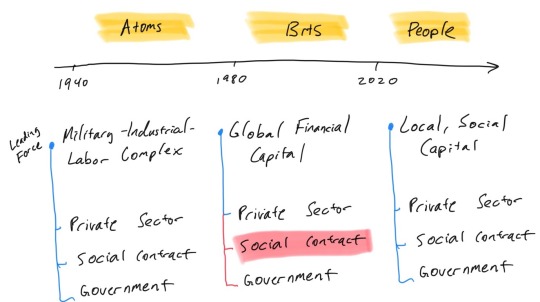
We can no longer just focus on the magical software bits and hope someone else figures out racial equity, employment, climate and health. This is Joel Spolsky’s Law of Leaky Abstractions on the ultimate scale. The abstractions are failing - and we’re seeing bugs and unintended consequences all around us. And the more we invest to deal with one-off bugs, the more likely we are to calcify change and imprison ourselves inside a failing stack. It’s like we decided to build the world’s notification service on Ruby on Rails - or building an iPhone competitor on Windows CE. Fail Whale everywhere. Unfortunately, America’s democratic institutions are in poor condition. They are struggling to deal with inequality let alone looming environmental disaster. A polarized electorate - particularly at the national level - leads to populism and makes it hard for these institutions to execute meaningful, long-term plans.
We talk a lot about speech, misinformation, fairness of targeted ads etc. But it’s becoming clear that UX, linear algebra/training data and monetization in our products is just the tip of the spear to address polarization. We believe polarization is a product of the underlying conditions of civil rights, education, health and climate debt that affect Americans differentially based on race, wealth, neighborhood and region.
So will today’s peaceful protests for racial justice expand into tomorrow’s revolution(s) for economic freedom? If you don’t think things are bad now, think about what happens when the stimulus checks run out. Take a look at the amount of debt in the public sector, use any imagination about COVID, work out what happens to their tax base / pension returns and consider the impact on public services, public servants and their votes. MMT better be a real thing. Maybe we didn’t start these fires, but that refrain won’t save us when the flames come our way.
We’re done debating why we need to act. It’s clear America needs our help. Let’s talk about how we’re going to rise to the occasion. Our mantra will be “internalize, innovate, institutionalize”.
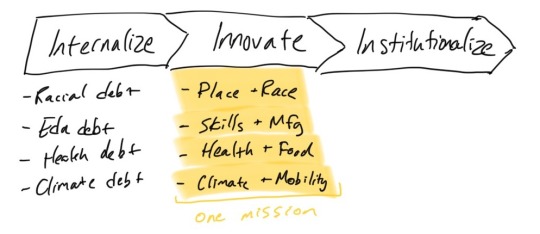
First, we’re going to internalize our problems. I’m here to tell you that issues of racial and economic justice are not just moral issues but they’re financial issues. Racial debt, education debt, health debt, climate debt will hit us harder and harder each year. (By the way, revolution probably won’t be great for your DCF models.) So we’re going to recognize these off-balance sheet liabilities - which amount to a few hundred billion in the US alone over the next 10 years for a company at our scale. You should assume other CEOs are thinking the same things - even if it takes them a few more quarters or years to say it.
Second, we’re going to innovate against these systemic problems - but our only shot at making progress is if we realign the entire company’s mission to address them. This is not about optics. This is not about philanthropy. This is not another bet. We have no choice but to put all our chips behind one bet - America - at least to start. It's the country that backed us in the first place, it's where most of our people are and most of our profits. The job for our existing products, platforms and cash flows will be to advance four areas: place / race, skilling / manufacturing, health / food and climate / mobility - starting in America. The board will measure me based on job creation and diversity. It should go without saying that we’re pausing dividends and buybacks for the foreseeable future. Every dollar will serve our mission. Every senior leader will need to sign up for our new mission - and those who choose to stay will receive a new, back-end loaded, 10 year vesting schedule. We want them focused on the long-term health of society - not the whims of Robinhood day traders or strengthening the moats of existing products. We will need to invent entirely new ways to operate and ship products. As Joel Spolsky said, “when you need to hire a programmer to do mostly VB programming, it’s not good enough to hire a VB programmer, because they will get completely stuck in tar every time the VB abstraction leaks”. We need engineers, designers and product managers that will look deep into the stack, confront the racial, job access, health and climate debts that our products, our companies and our communities are built on top of. This is not about CYA process to protect cash cows or throwing things over the fence to policy. We will need to innovate across technical, cultural and organizational lines. This requires deep understanding and curiosity. Systems and full-stack, not just pixels. This will bring more scrutiny to our company - not less. Change must not be the burden for only our Black employees or other subsets. Everyone must be on board - so for the next 12 months, we’re giving folks a one-time buyout if they want to leave.
Third, we can’t do any of this by ourselves. The problems are too big. Our role will be to provide enlightened risk capital (from our balance sheet or by re-vectoring operating spend) alongside R&D, product, platform leverage to help leaders and innovators pursue solutions in these areas. We will work with our peers and the public sector wherever possible - buying/R&D consortia, public-private partnerships, trusts, etc. Collaboration is the default, not the exception. But the new era and landscape demands that we explore institutional models beyond global capital/startups, labor unions, NGOs or government. We need models that can more flexibly align people and purpose, that innovate on individualized vs. socialized risk/reward - and that ultimately help build and sustain local, social capital. It’s difficult to say what these will look like - but increasingly figuring this out will be existential for our core business. Right now, it doesn’t matter if you’re designing the best cameras in Cupertino or the best ways to see their snaps in Santa Monica - we’re all just building layers of an attention stack for global capital. Our Beijing competitors have figured this out. ByteDance is already eating our lunch. They’re using the same tech inputs as us - UX, ML and large-scale systems - which are now a commodity - but with vastly lower consequences for the content they show - creating a superior operating / scaling model. They’re not internalizing social or political cost. What we need in this era is the accumulation stack - where each interaction builds social capital. This is not about global likes. This is about local respect. We’ll create competitive advantage when we build products that reach across race / economic lines to harness America’s amazing melting pot and do so in ways that build livelihoods / property rights for creators and stakeholders.
With this operating model in place, we’re committing to fundamental change in four areas:
Place & Race - Over the next 10 years, 100% of our jobs will be in diverse communities that embrace inclusive schooling, policing, housing and transit policies. (Starting tomorrow, we’re putting red lines on our maps around towns with exclusionary zoning.) This is not about privatizing cities or an HQ2-style play to extract concessions. This is about investing our risk capital and our reputation to innovate alongside government. How do we bring world-class education to neighborhoods with concentrated poverty? What is the future of digital/hybrid charter schooling? Unbundled public safety? We’re done with de facto segregation. We’ll embrace “remote-first” with physical centers of gravity as a means to this end. The Bay will become one physical node alongside several others (e.g. Atlanta, DC, LA) creating a strategic network to develop diverse talent across the country. We’re going to coordinate our investment with leading peers - since after all, this isn’t about cost or cherry-picking. It’s about broadening our country’s economic base.
Skilling & Manufacturing - We’re going to 10x the tech talent pool in 10 years - by inventing new apprenticeship models that bring women, minorities and the poor into the workforce. We’ll start with our existing contractor base, convert them to new employment models with expanded benefits and paths for upward mobility. Next, we will invent new productivity tools for all types of workers - from the front office to mobile work to call center - that brings the power of AI and programming to everyone. These will be deeply tied into new platforms for work designed from the bottom-up to build social and financial capital for individual workers and teams. Last, we’re setting a goal to manufacture most of our hardware products - from silicon all the way to systems - entirely in the US in 10 years. This will require massive investment, collaboration and innovation. It may require a revolution in robotics - but we will pursue this in a way that makes the American worker competitive - not a commodity to be automated away. If we’re successful, the dividends of our investment here will have massive spillover benefits to every other sector of manufacturing in the US - autos, etc. - including ones we have yet to dream up.
Health & Food - We’re not going to tolerate a two-class system for healthcare. As we convert our contract workforce to new employment models, we’ll innovate on the fundamental quality/cost paradigm. This may feel like a step down but it will put us (and the rest of society if we’re successful) on a fundamentally better long-term trajectory. Can we use AI to help scale the reach of community health workers? Can we help them create co-operatively owned care delivery orgs that offer new ways to share risk and support behavior change? Local, social capital is critical. Food is part of Health, and we’re going to innovate there too. Free food for employees is not going to come back post-COVID. Instead, we’ll use our food infrastructure to bootstrap cooperatively-owned cloud kitchens. We’ll provide capital to former contractors - mostly Black and Hispanic - to invest and own these. We’ll build platforms to help them sell food to employees (partly subsidized), participate in new “food for health” programs and eventually disrupt the extractive labor practices we see across food, grocery and delivery.
Climate & Mobility - Lastly, we’ll be imposing a carbon tax on all aspects of our own operations - which we’ll use to “fund” innovation in this space - with a primary focus on job creation. This is an area where we’re going to be looking far beyond our four walls from the beginning. As a first step, we’re teaming up with Elon and Gavin Newsom to buy PG&E out of bankruptcy and restructure it as a 21st century “decentralized” network of community utilities. It will accelerate the electrification of mobility - financing networked batteries for buses, cars and bikes along with charging infrastructure - and lead a massive job creation program focused on energy efficiency. It will use its rights of way to provide Gigabit ethernet + 5G to everyone - which will help people and help fund some of this. Speaking of mobility, private buses aren’t coming back after COVID. Instead, we’re teaming up with all of our peers to create a Bay-wide network of electric buses (with bundled e-bikes) that will service folks of all walks of life - including our own employee base. Oh and one more thing - we’re bringing together the world’s most advanced privacy/identity architecture and computational video/audio to bake public health infrastructure directly into the buses. For COVID and beyond. None of this is a substitute for competent, democratically accountable regional authorities. This is us investing risk capital on behalf of society - with the goal of empowering these authorities.
Open technology for global progress - While we have to prioritize America given the scale of problems, the intent is not to abandon the rest of the world or hold back it’s progress. We feel the opposite - that over the coming decades each country’s technology sectors will thrive. To get there, we will continue to invest patiently - hiring, training, partnering, investing and innovating - but with a clear north star to help each country develop local leaders in new areas. Long-term, we’ll continue to contribute open technology that others can build upon.
America should be the proverbial city on a hill for everyone - not a metaverse for the rich with the poor dying in the streets. We don’t have much time so we’re getting to work now. See you next quarter.
2 notes
·
View notes